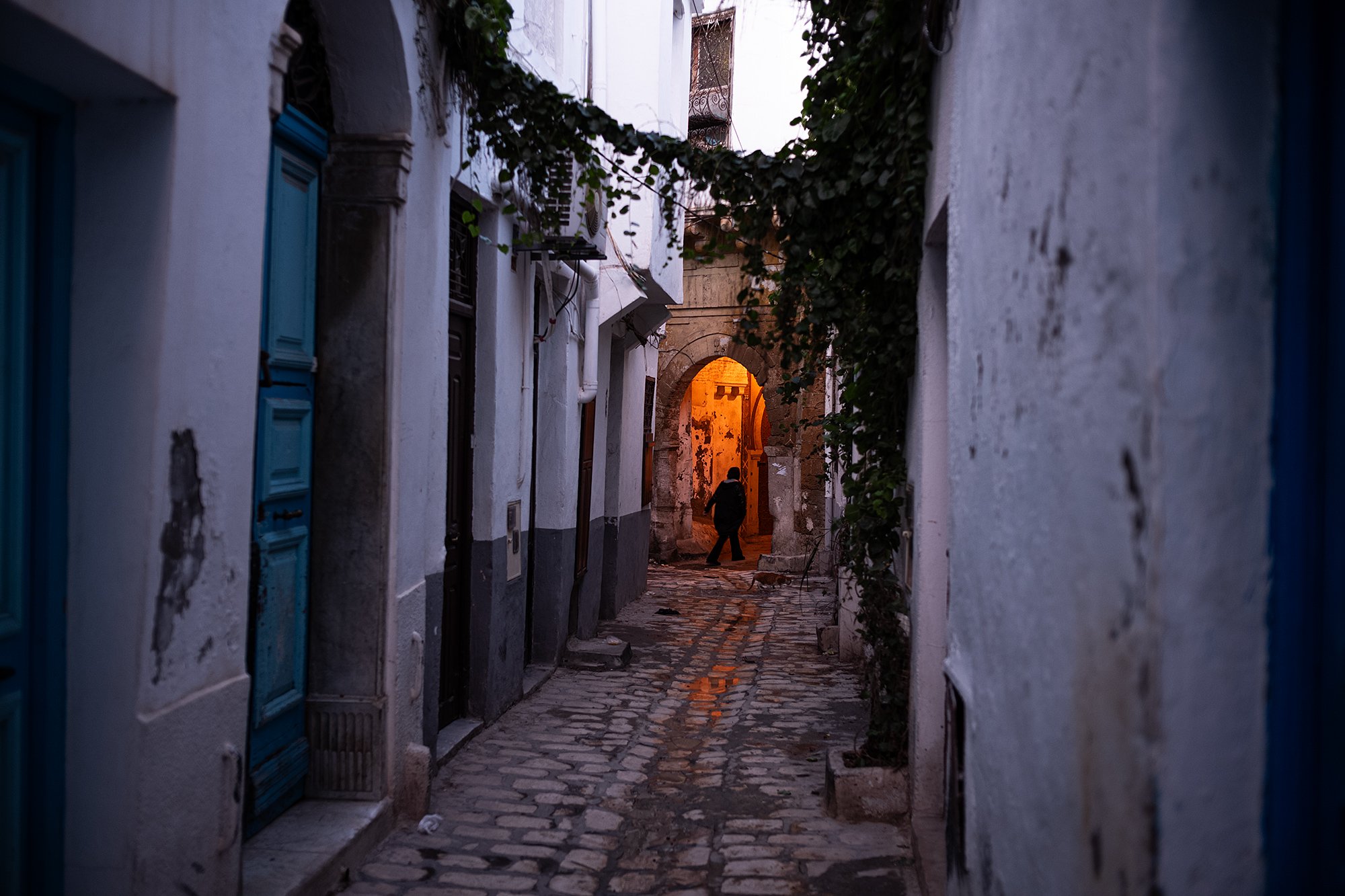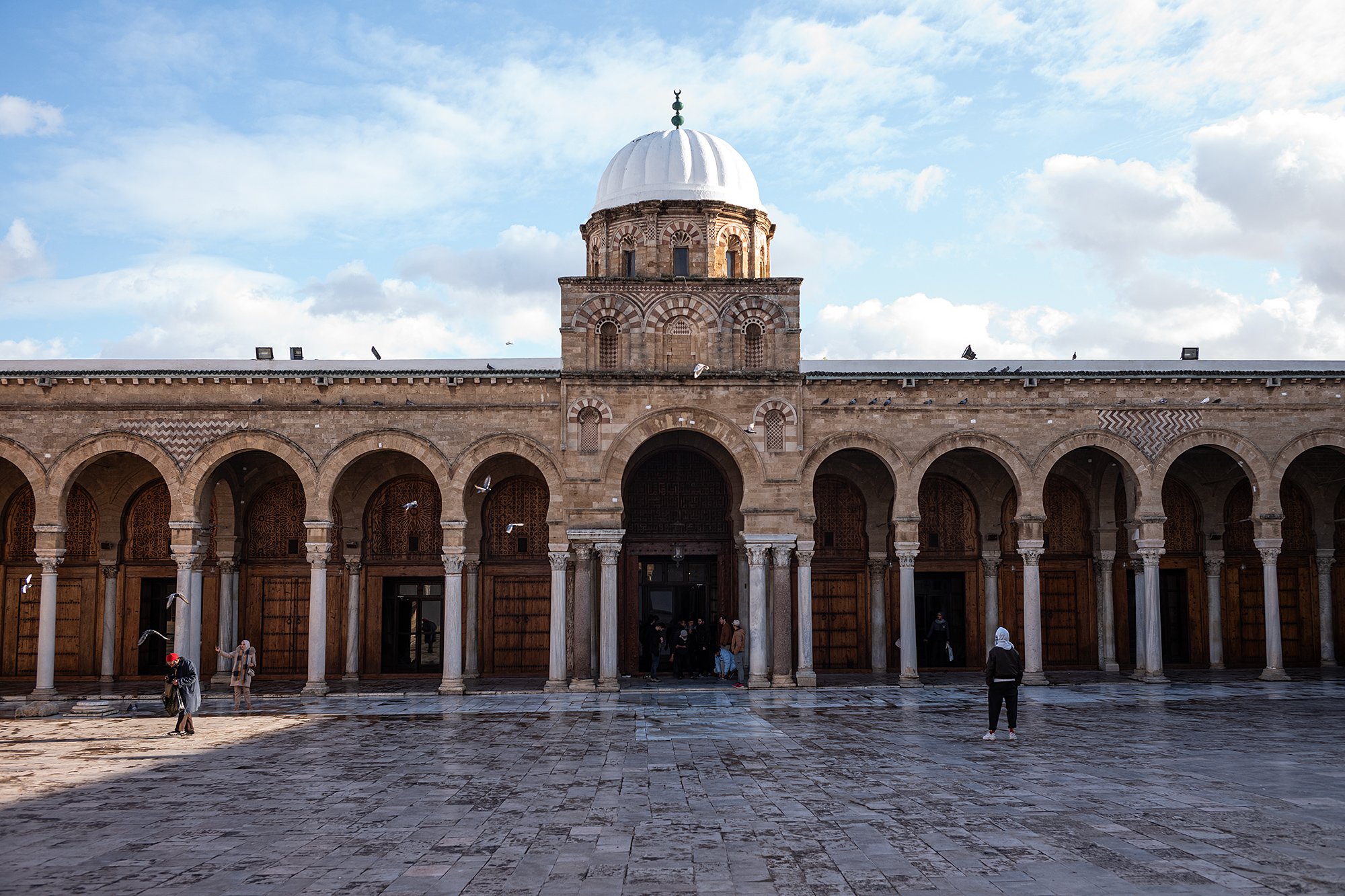
Tunisia
Chapter one
Arrival in Tunis and an introduction to the medina.
Nos Amis, chapitre 20: Aziz Slim et son frère Ahmed marchande dans les souks.
I don’t remember much from my high-school French, but I remember this. It was my favorite chapter, and I can still hear the ambient sounds of the market play in my head when I think about it.
I don’t know if that’s what first piqued my interest in Northern Africa, but it couldn’t have hurt. My first trip to the region was to Morocco, and since then I’d wanted to visit Tunisia. This year I finally made it, flying in from Munich after almost a month in Ljubljana.
I had spent a fantastic afternoon and evening in Munich. A friend of mine happened to be in the city at the same time and we met up in Marienplatz under the central column, surrounded by one of the many Christmas markets that take over the plazas and squares. She and her partner played tour guide, bringing me around to churches, palaces, parks, and surf spots.
She brought me to the Asamkirche, built by a pair of brothers—one a sculpter and one a painter—that seems to serve as a showroom of their abilities. She taught me to rub the noses of the lion statues in front of the Residenz for wealth and luck and she led me inside for wine and cheese. For dinner we had bratwurst from a stall in a Christmas Market and ended up at a tiki bar under the hotel from which Michael Jackson infamously dangled his baby from a balcony. A shrine to Jackson has since overtaken the plinth that supports a statue of Orlando di Lasso, a composer of the late Renaissance.
My friend wonders if di Lasso laments the attention given to another; I counter that were it not for the shrine, I’d never have come to visit di Lasso.
I am up the next morning before the dawn and take the bus back to the airport. The customs official seems slightly perplexed at my short stay in Germany until i explain that I’m on a layover. He stamps my passport and wishes me well.
I nap at the airport; I nap on the plane. Arriving in Tunis, the line for immigration is slow, but I’m in no rush and wait patiently for my turn.
Arbi is waiting for me when I emerge, my name writ large on a saran-wrapped sign he holds before him. He welcome me to Tunisia and helps me with my bags, leading me to the parking lot where his car is parked. It’s raining pretty steadily, and I’m glad I purchased rain covers for all my backpacks the last time I was in the States.
There’s an issue exiting the parking lot. The gates don’t seem to be opening. A lot of yelling in Arabic ensues, with Arbi joining the fray. He laughs as he calls out; it’s as if it’s all part of a game. An attendant shows up and helps people with their tickets and Arbi calls out to him as we pass.
Driving on the highway is chaotic, but not as much as I might have expected. Lanes are adhered to for the most part, and traffic flows freely.
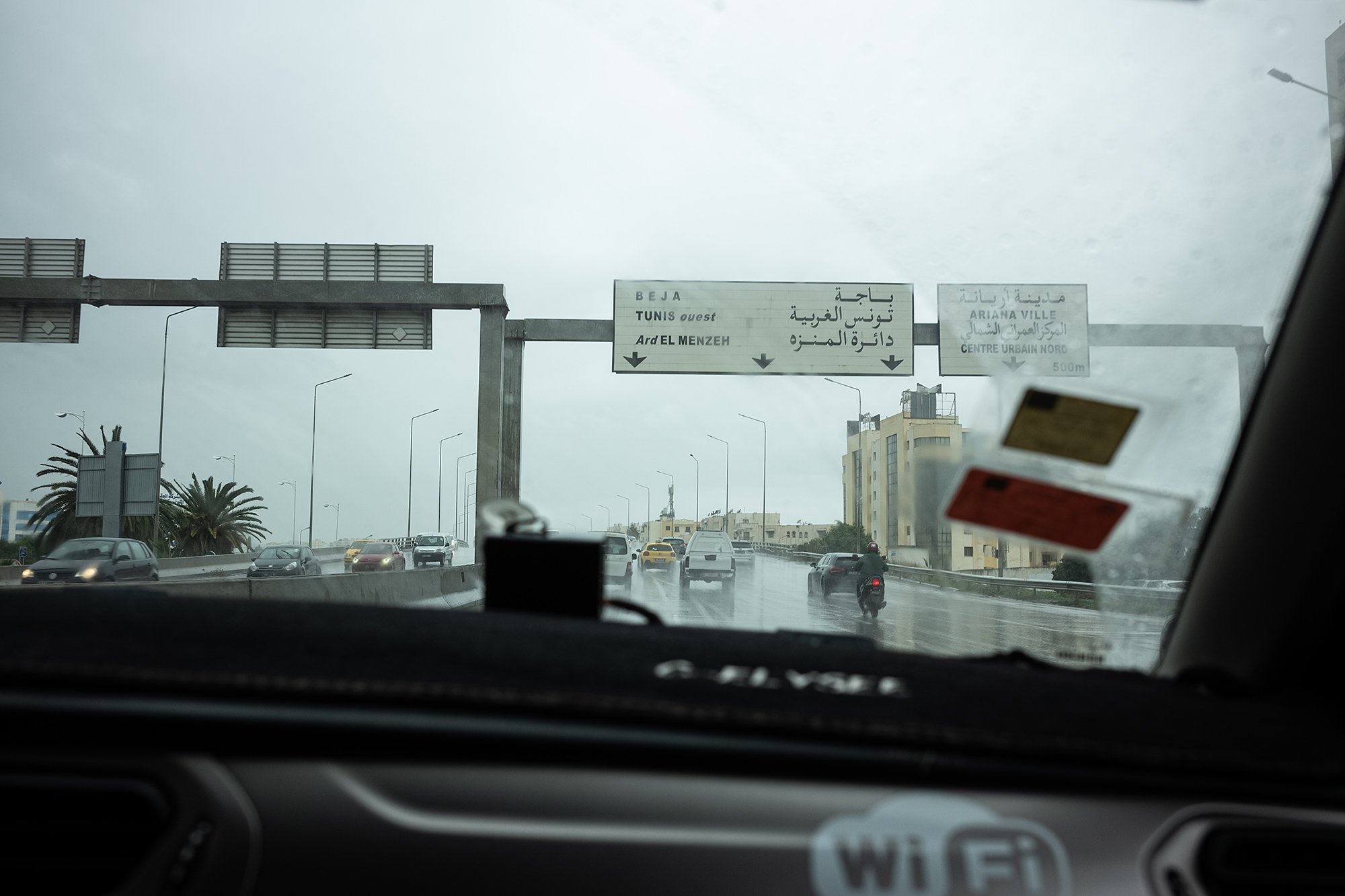
We turn off the highway onto smaller streets and then turn onto a street of white cobblestones. Welcome to the media, Arbi says and slows down, driving carefully through the narrow streets, negotiating with oncoming traffic to determine who will give right of way.
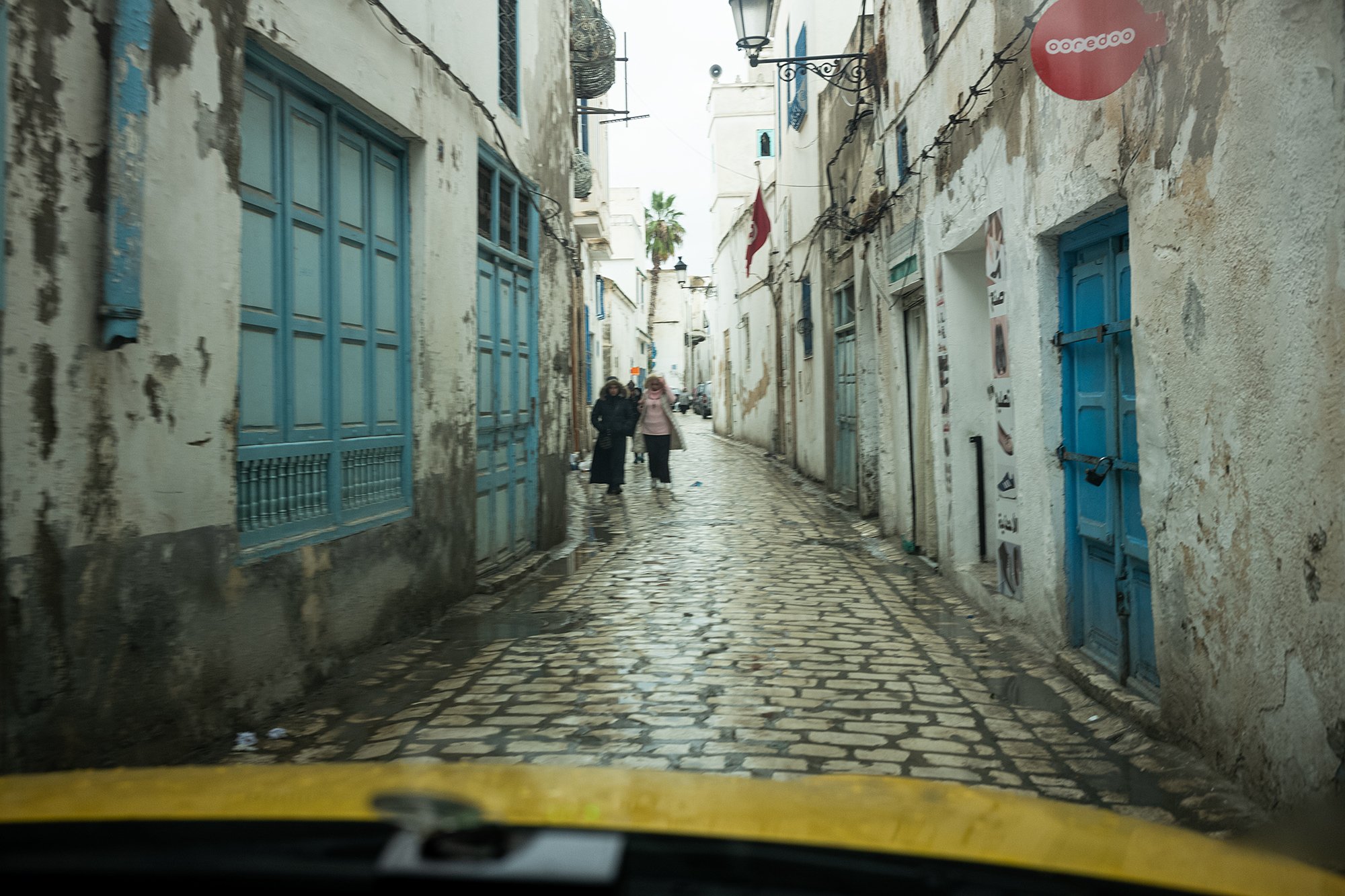
At a square he parks the car and shoulders a bag. I follow him through the medina until we arrive at a non-descript door. A man stands outside and opens it with a key. Arbi heads in and up the stairs and I follow him. Sonia greets me and Arbi shows me to my room, a large rectangle with an alcove for the bed. tiles cover the walls, the hexadecagonal ceilling painted with a floral pattern.
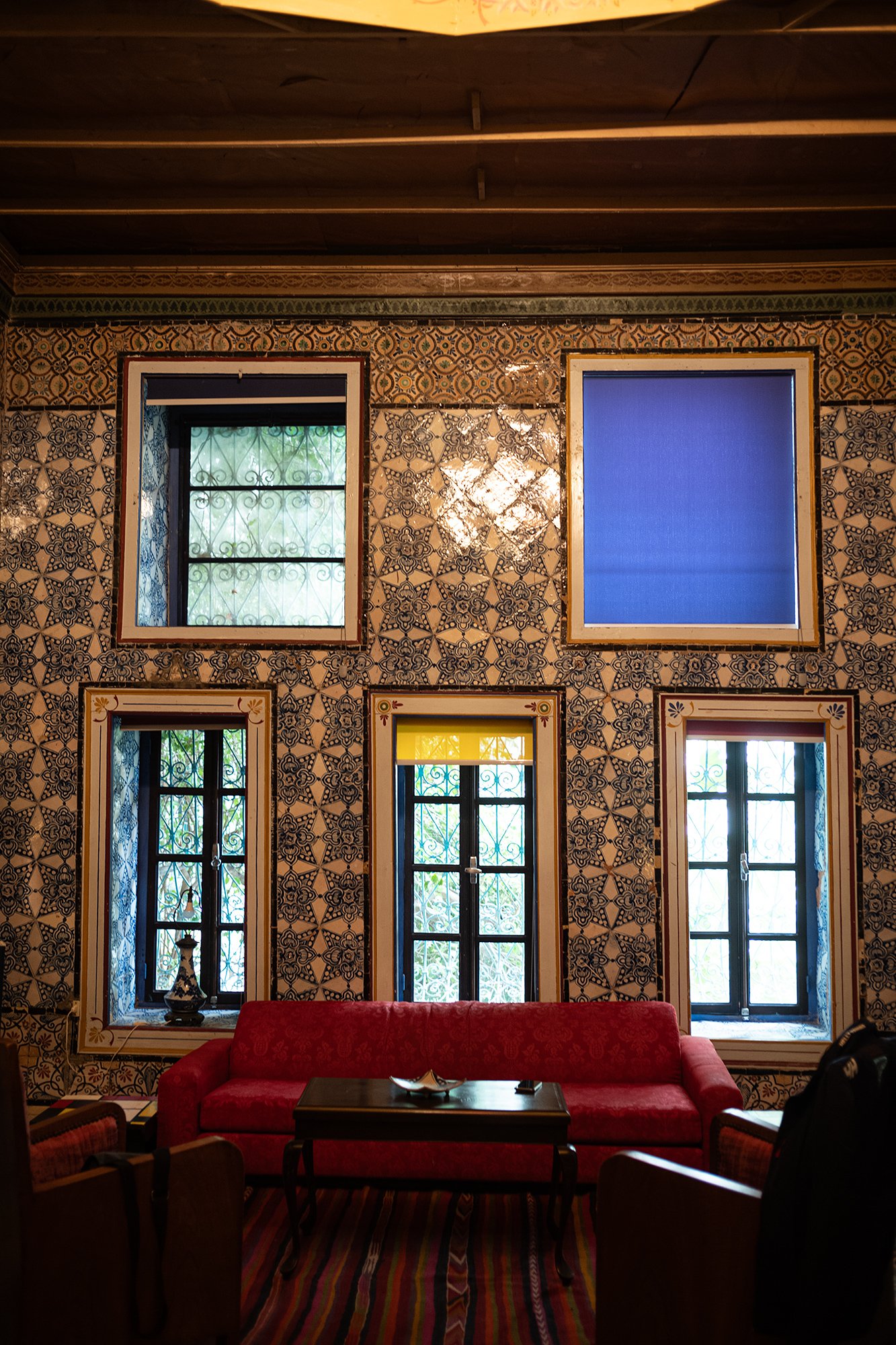
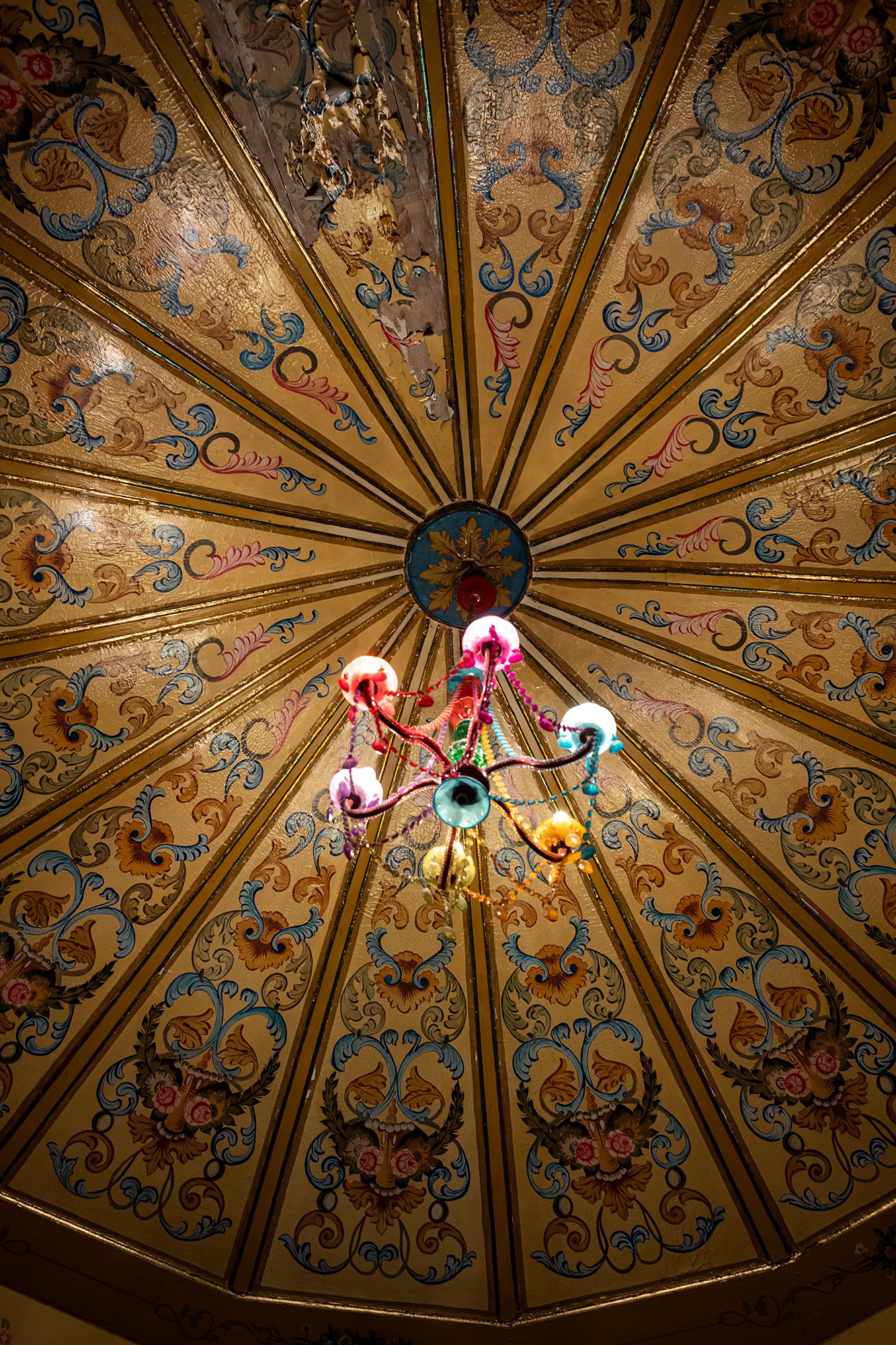
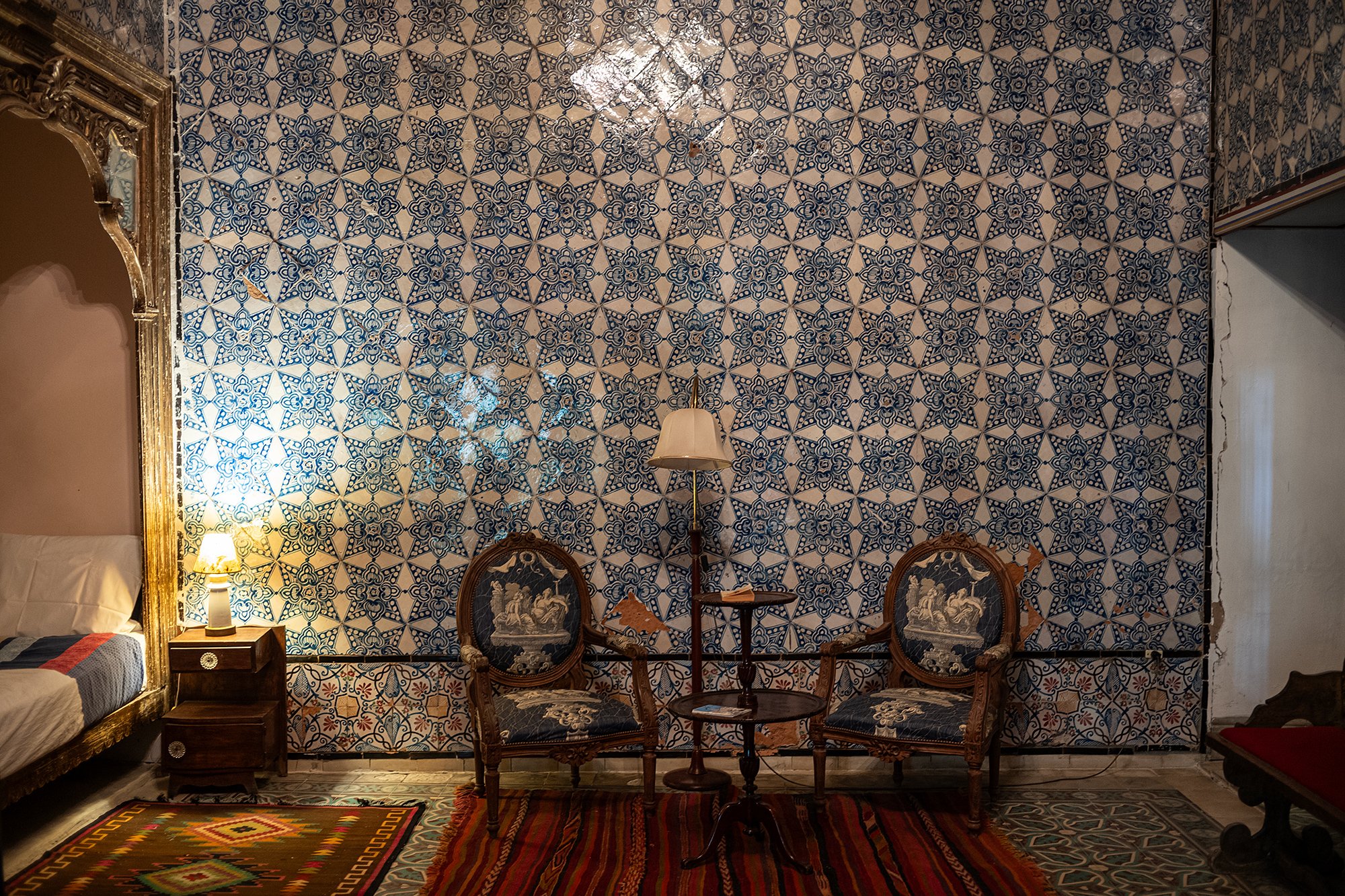
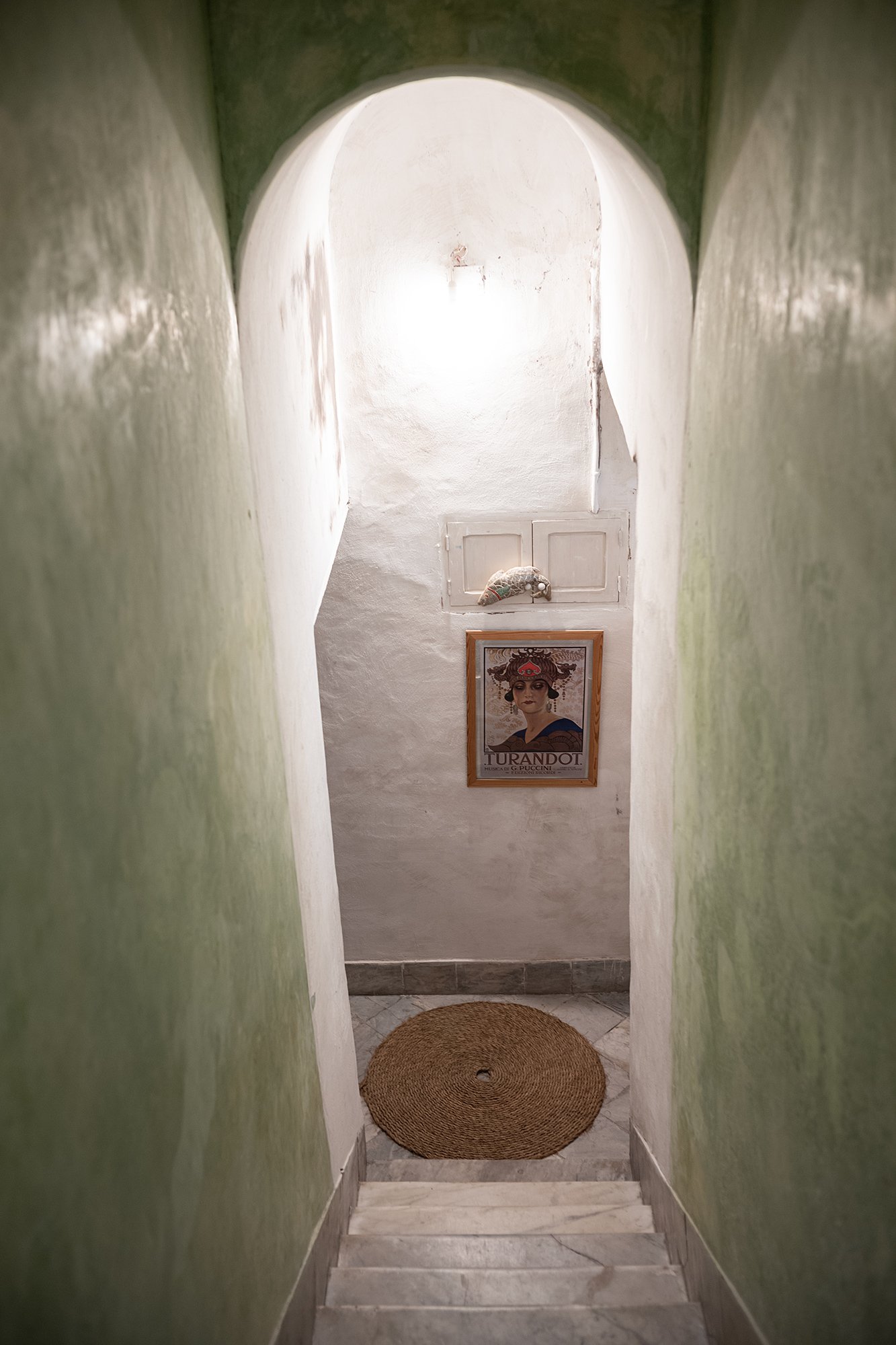
I pile my bags in a corner and unpack my Sonos. On the way from Ljubljana to Munich I had met a Spanish student studying for her masters in Chemistry, and over the course of our conversation I asked what type of music she listens to. Being from Bilbao she told me she listens to mostly Basque music, and I ask her for a recommendation. I put the album on and settle in to take a nap. The past two days have been ones of early morning alarms and travel and I still need to catch up on my sleep.
I set my alarm for two hours but thirty minutes later I’m awake. Looking at the time, I decide not to waste any more daylight and plot a route through the medina to catch some of the major sites.
The streets are quiet, the white walls and blue doors remind me light of Chefchoen in Morocco. The rain has stopped and the sun is shining. In the back of my mind I’m thinking about my first meal and I keep an eye out for any restaurant that might be open. It being Sunday it looks like almost nothing is.
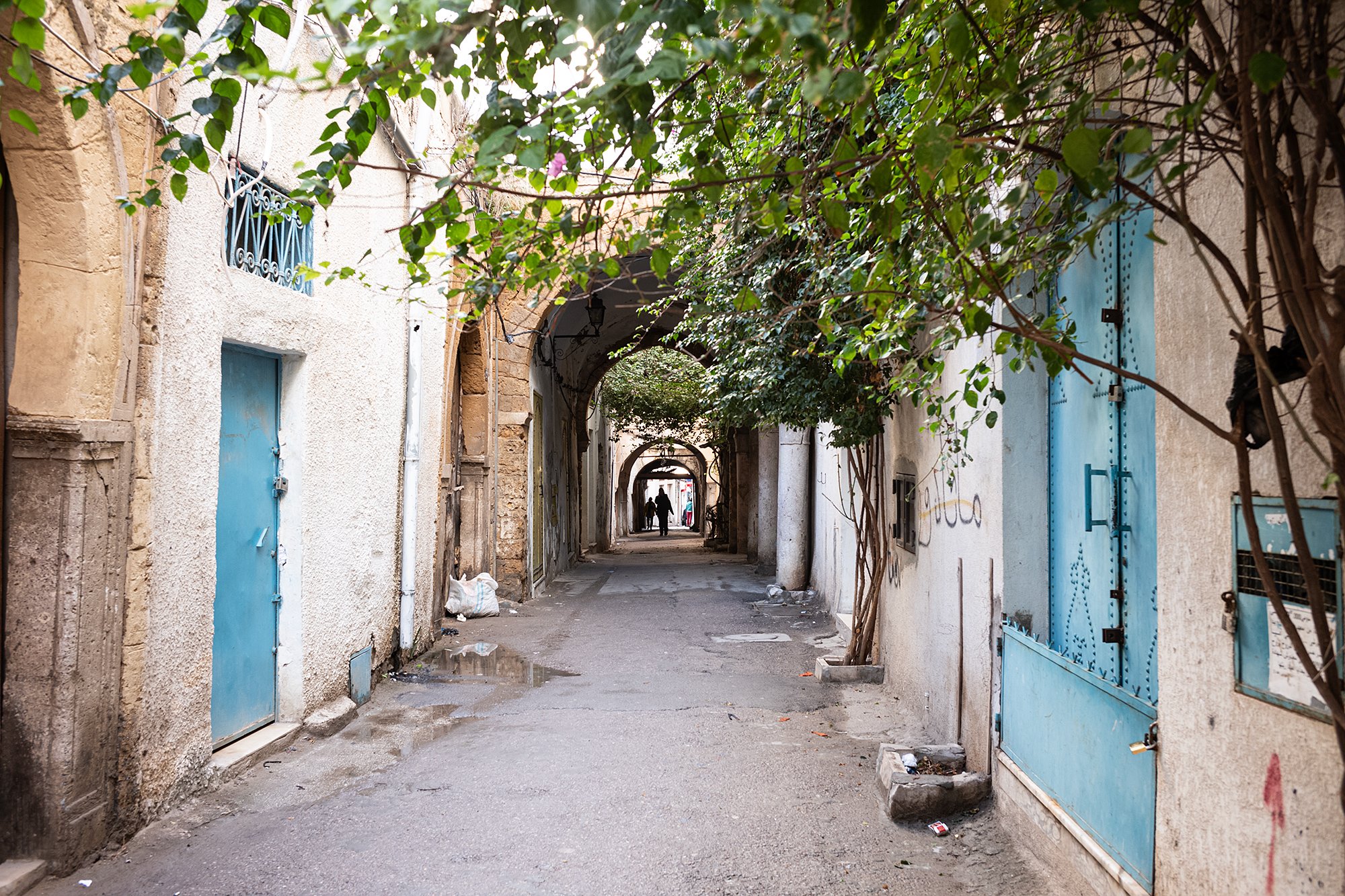
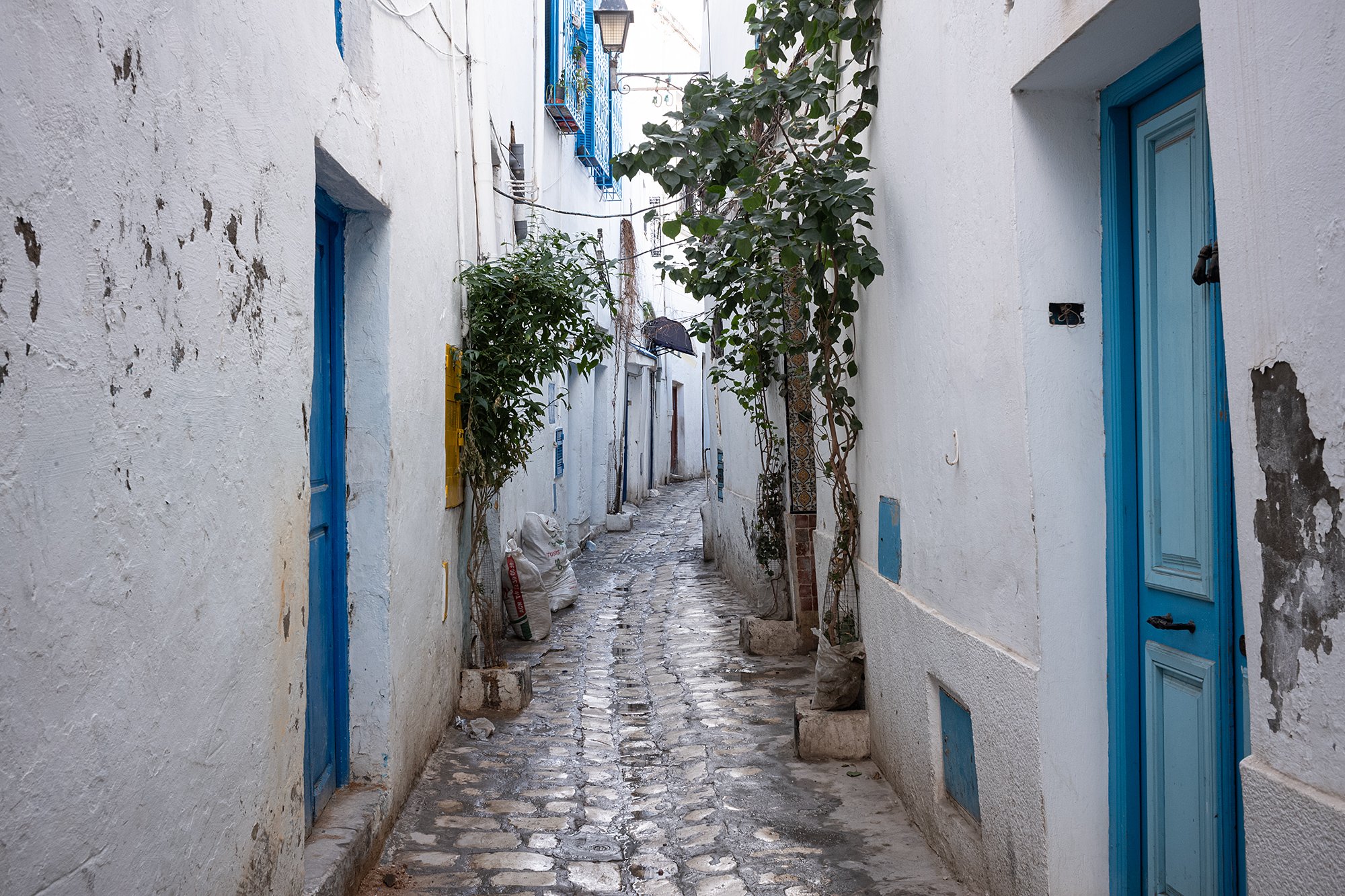
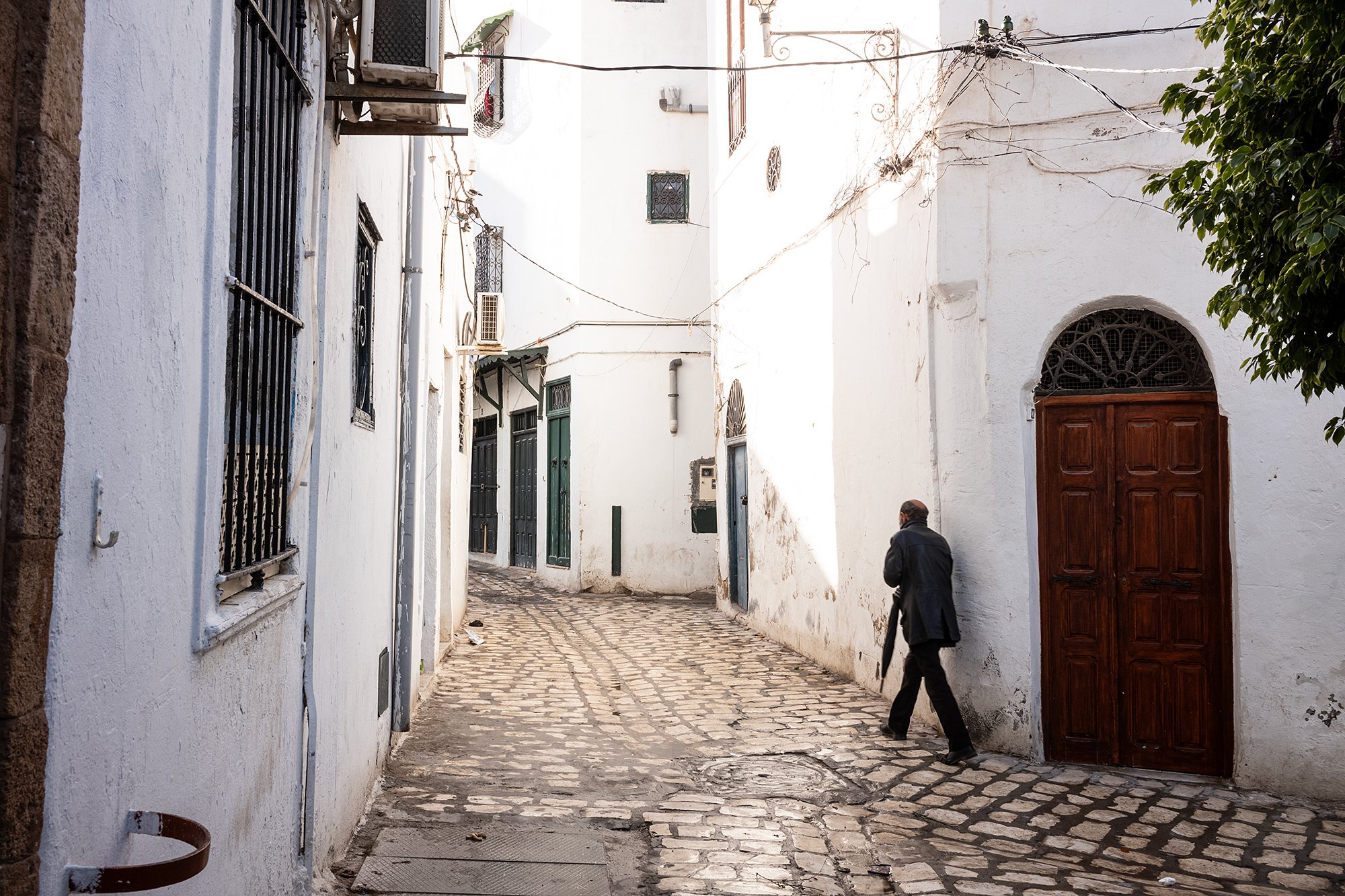
I pass a fast food stand selling pizza, chapati mahdia, and malfouf. I keep it in mind. Further down there’s a restaurant boasting a rooftop cafe that purports to be open. I note it.
Down one street I spy the minaret of the Hammouda Pacha Mosque. The street is lined with cafes, and I look at the tables full of cups both empty and full, but no food. I continue on.
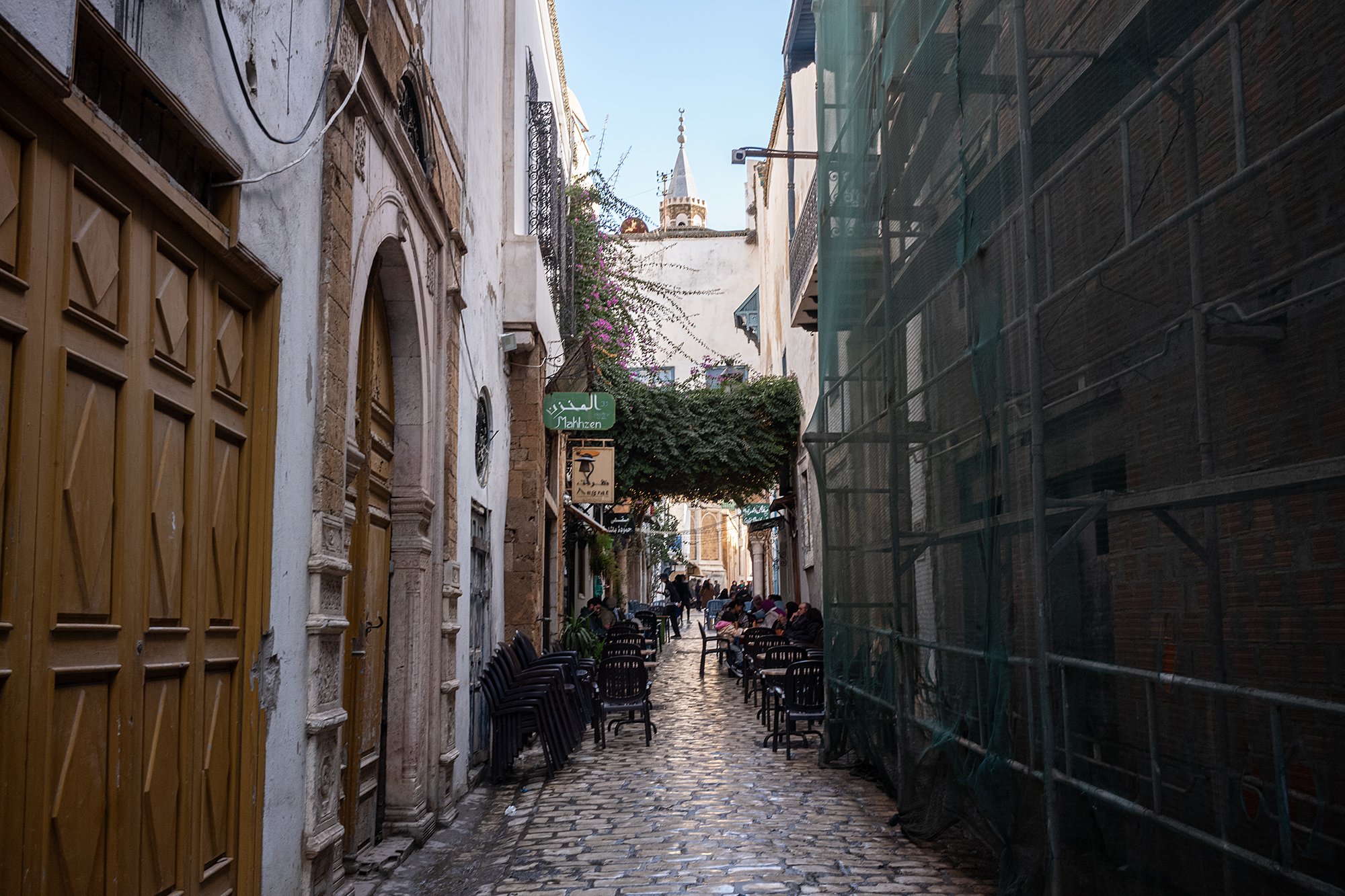
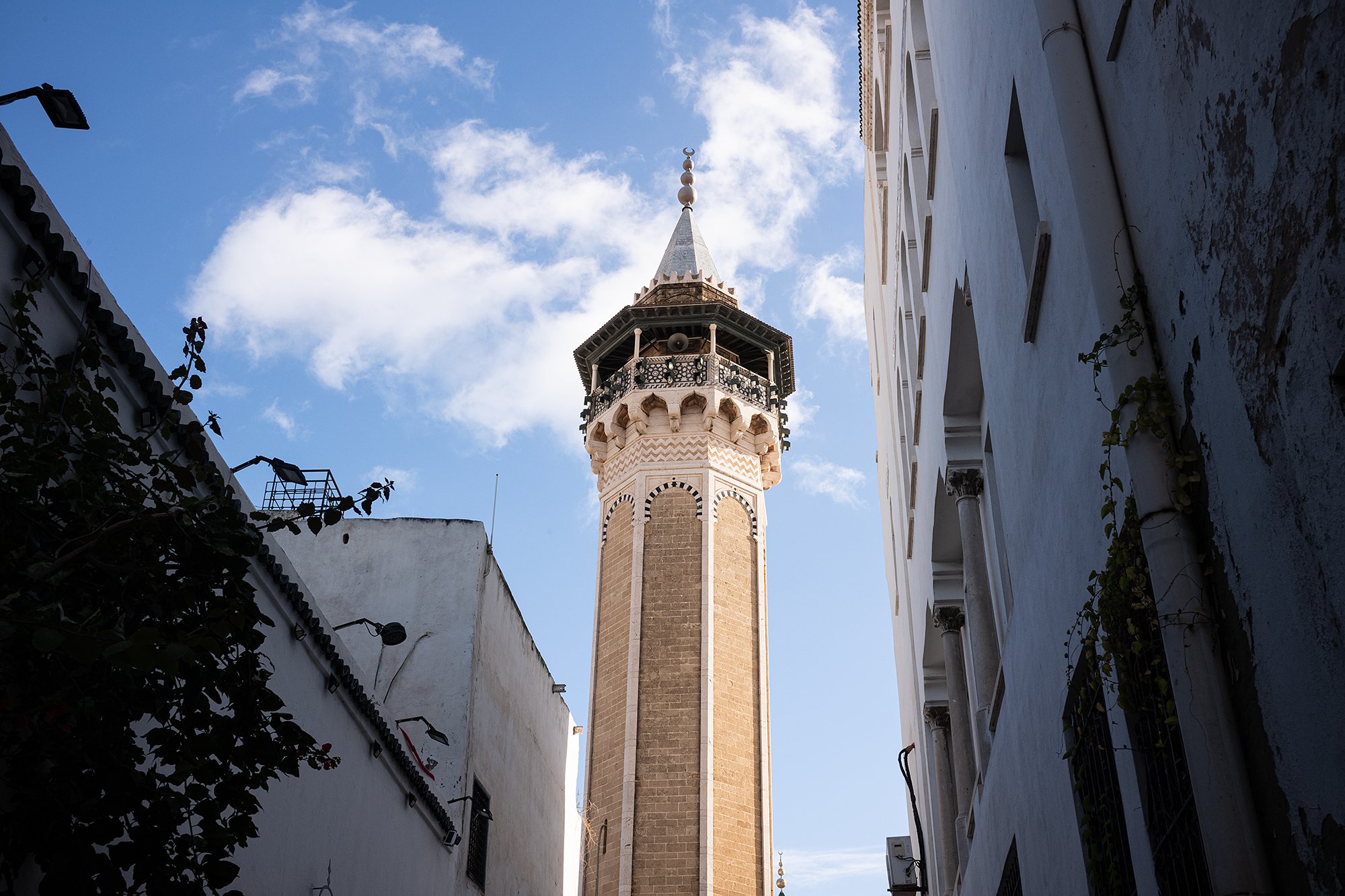
Turning right I head to Kasbah square, passing the Place au Government. The square is barricaded for reasons unknown to me and I walk where I can and take what photos I am able.
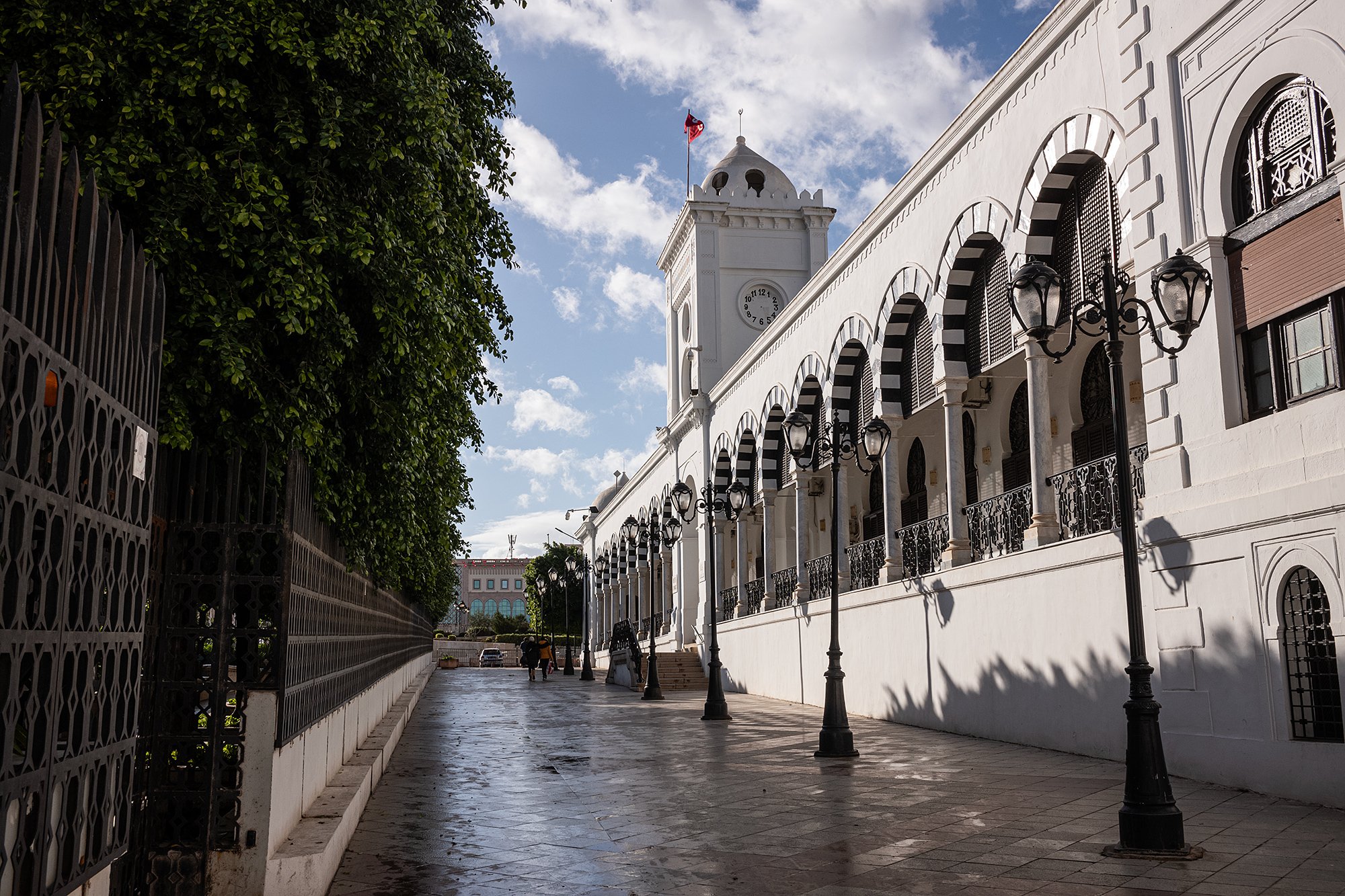
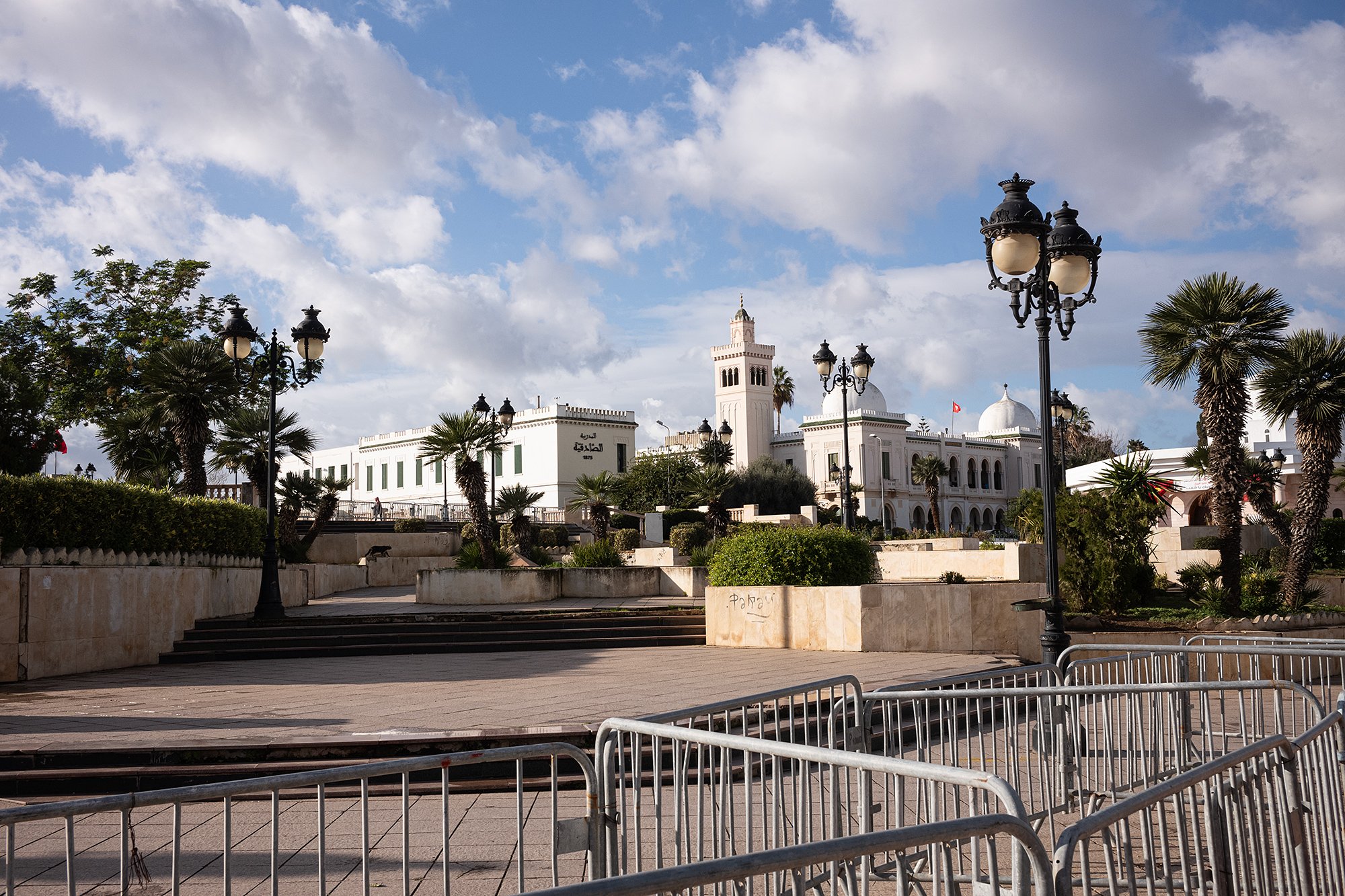
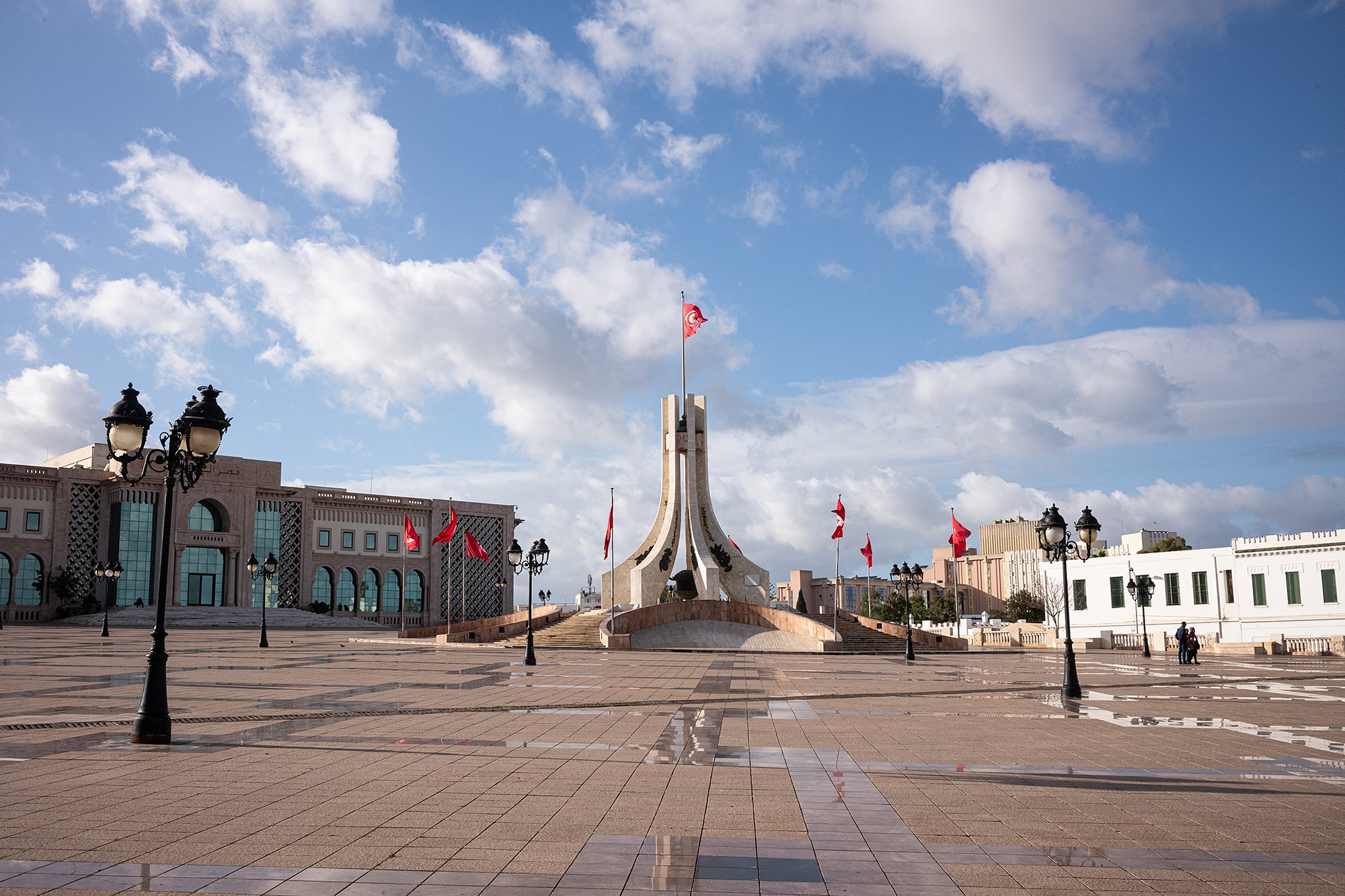
Heading back into the medina I find myself in the souk, the stores shuttered for the day. It’s quiet, a marked contrast to what I expect the scene would look like any other day, and I savor the quiet and tranquility whilst I can.
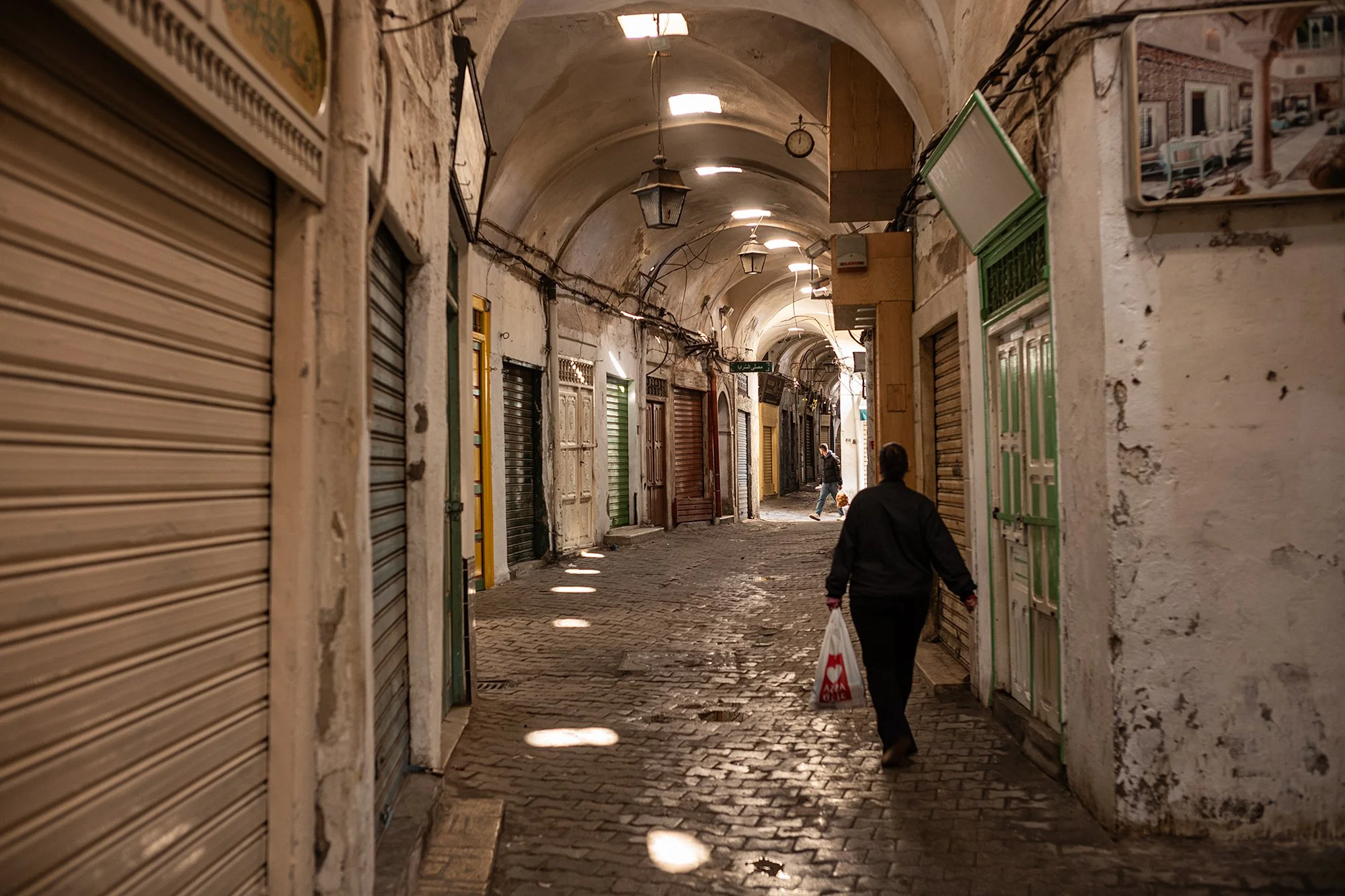
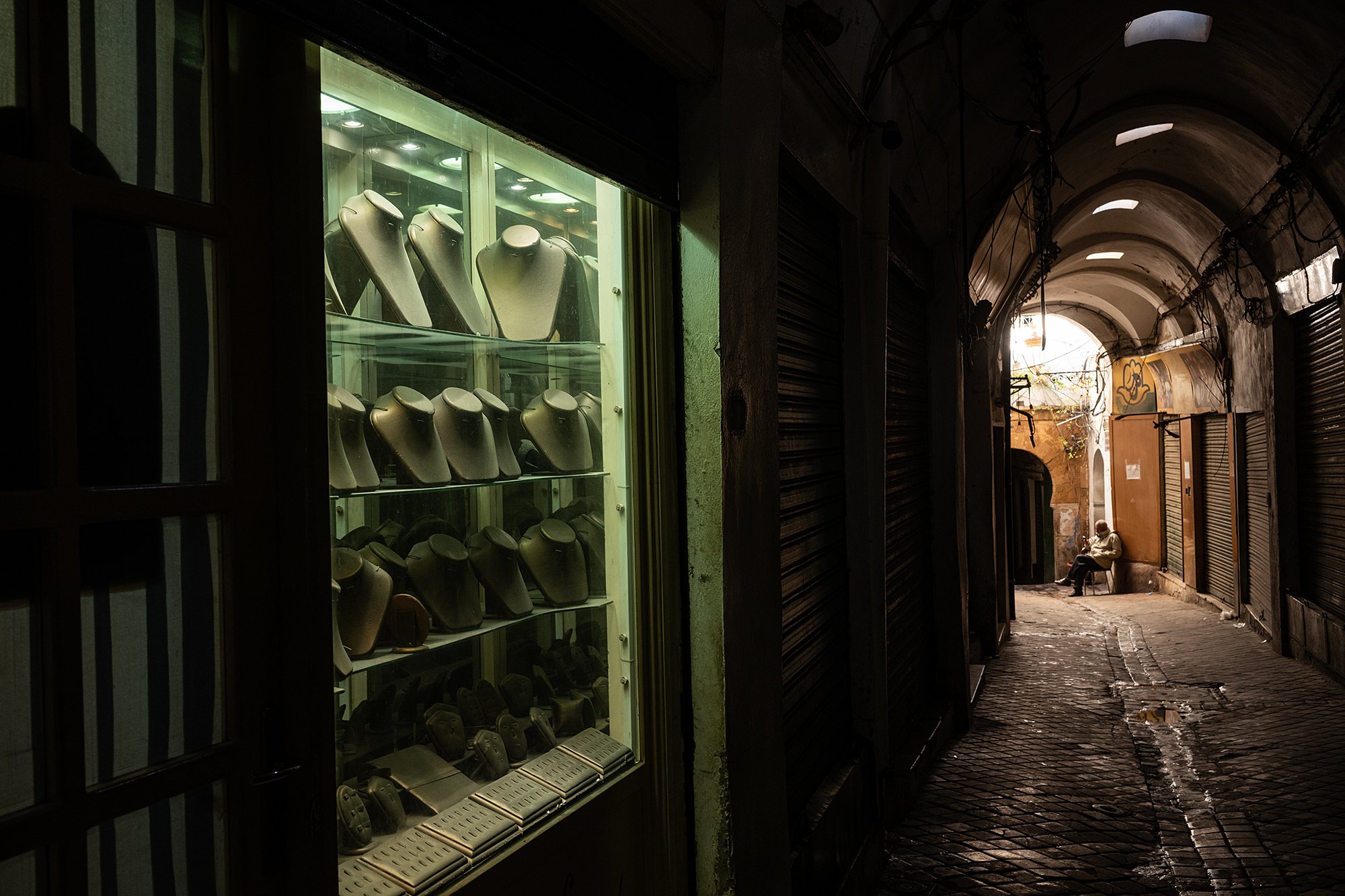
Wandering the streets and alleys, I stop into some of the more tourist-oriented stores that are open looking for postcards. In one the attendant asks if I’d like to visit the terrace. There’s a cafe and views over the city and the Ez-Zitouna Mosque. He points to a set of stairs and I climb.
At the top a man welcomes me to the cafe. Ten dinars, he says. I reluctantly hand over the money and debate whether I should ask for a cafe. I haven’t eaten since breakfast, however, and I don’t want to disrupt my sleep. And so, after taking a few photos, I head back down into the streets.
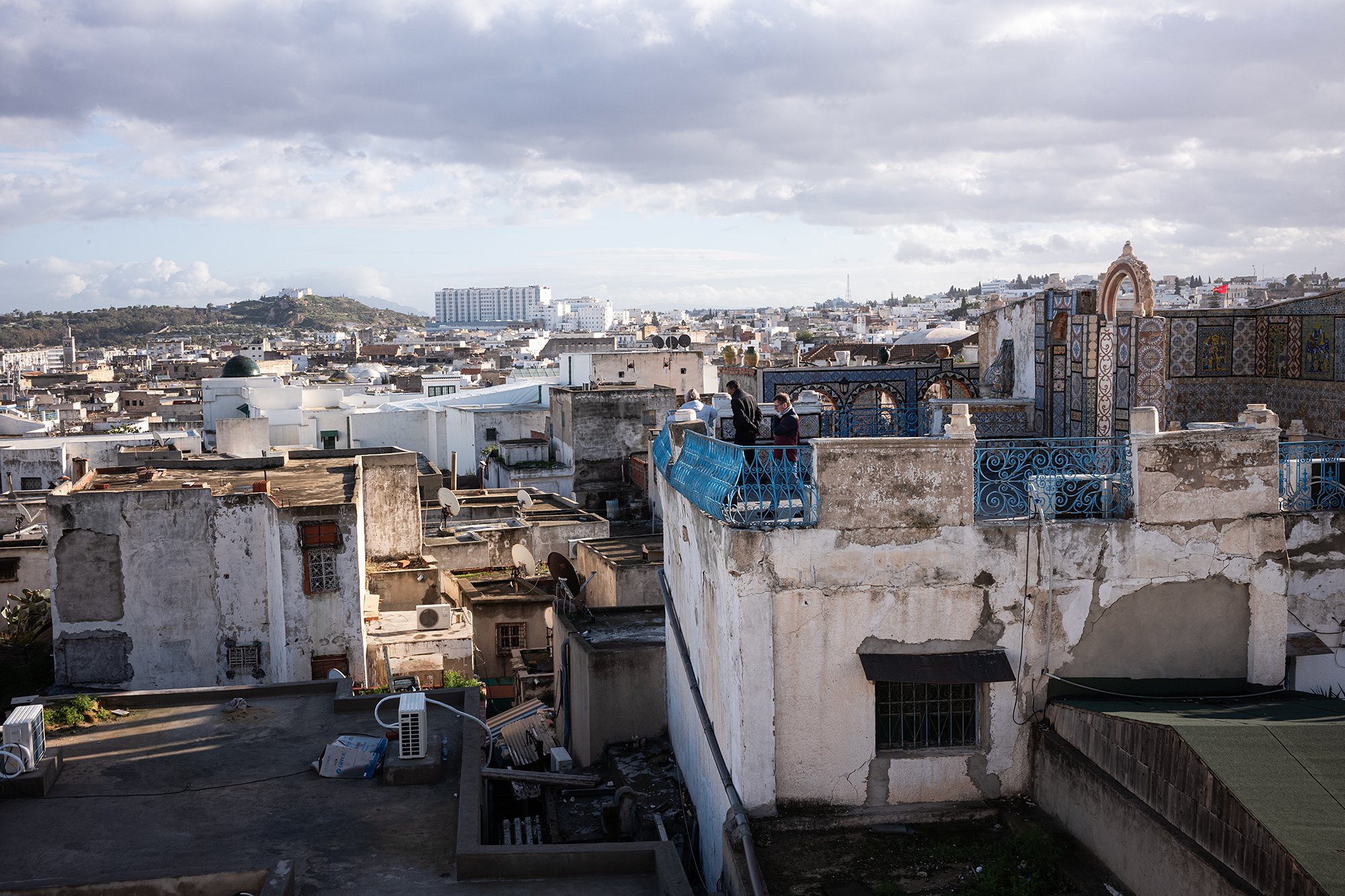
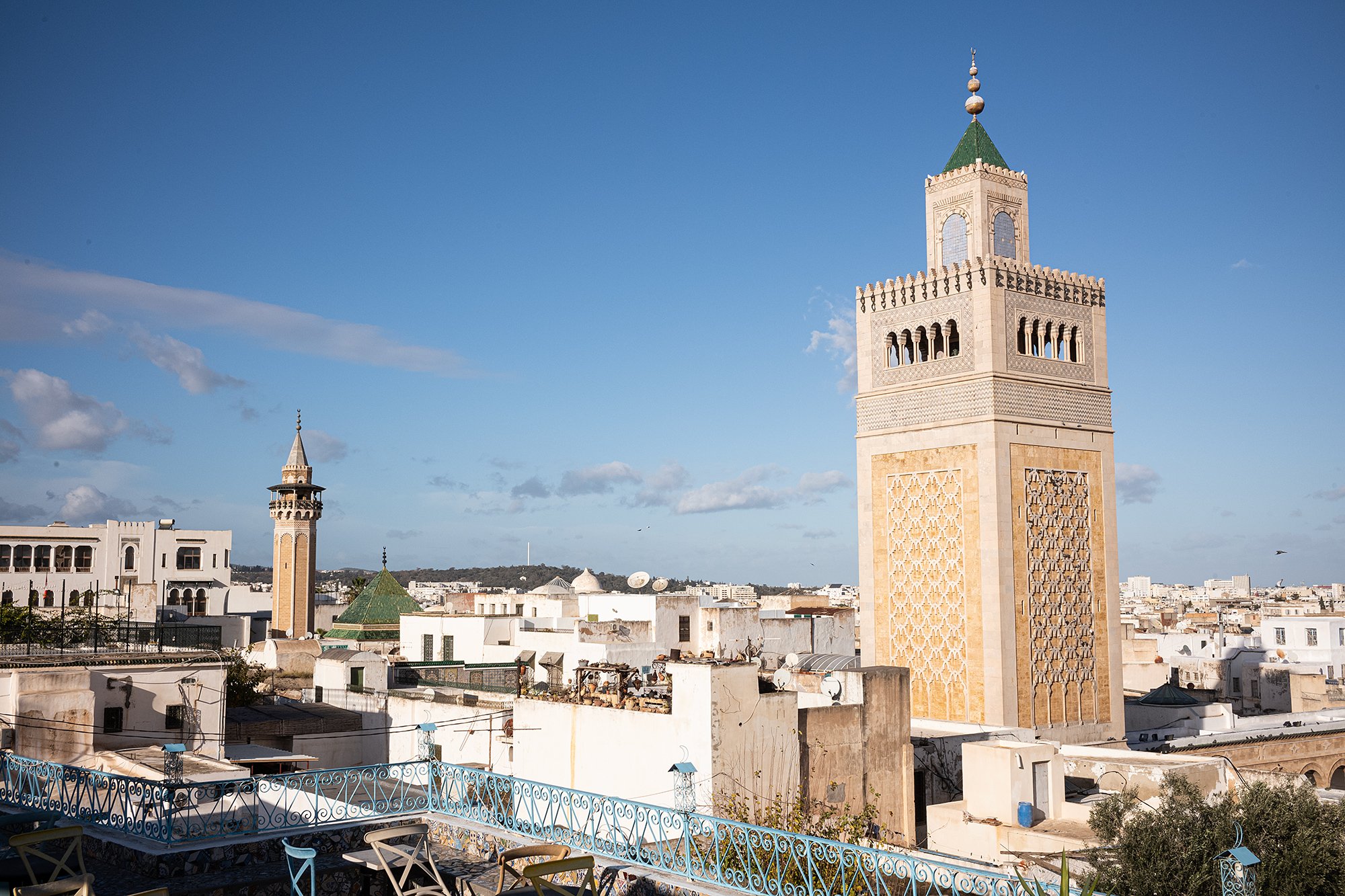
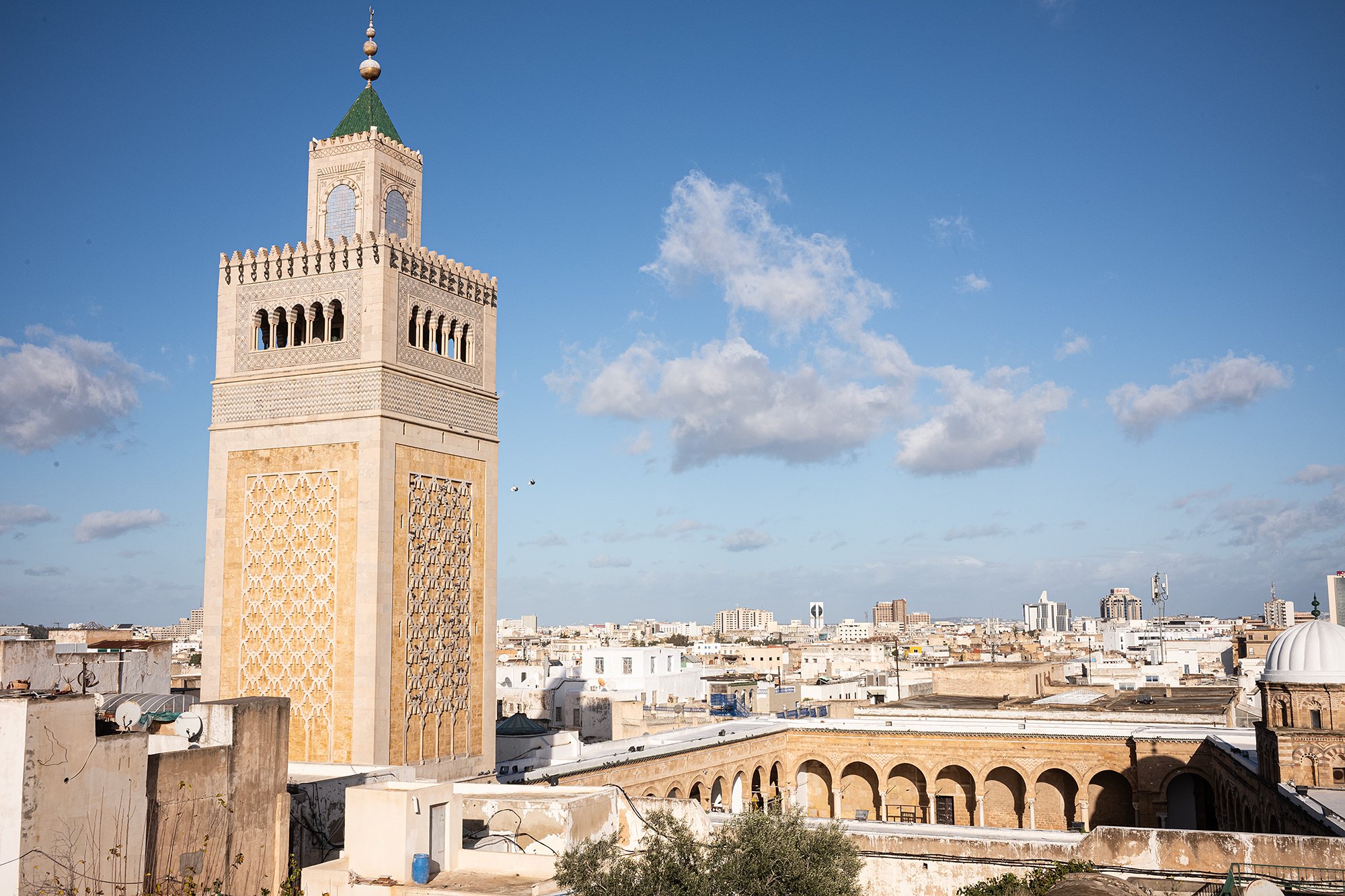

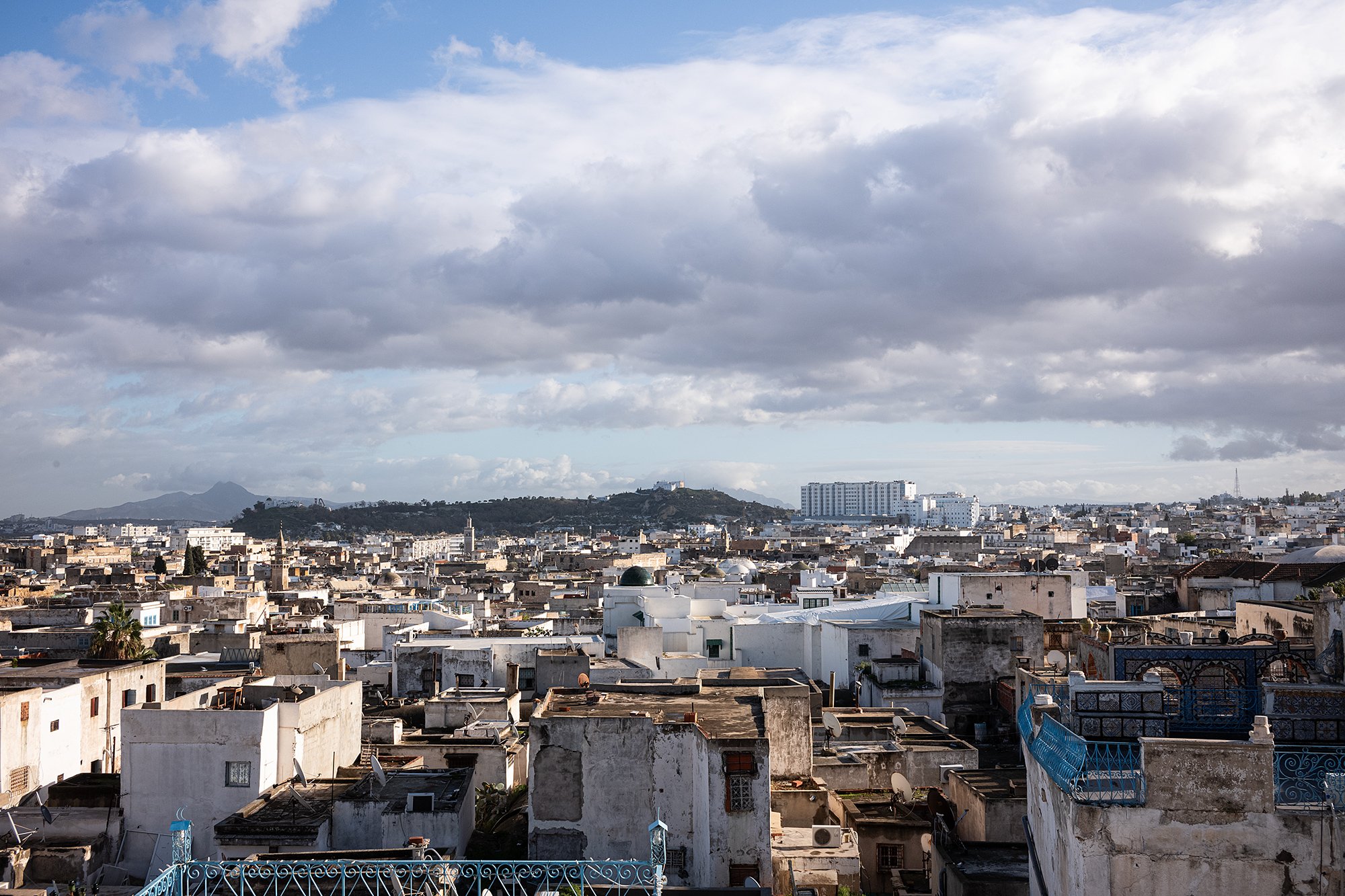
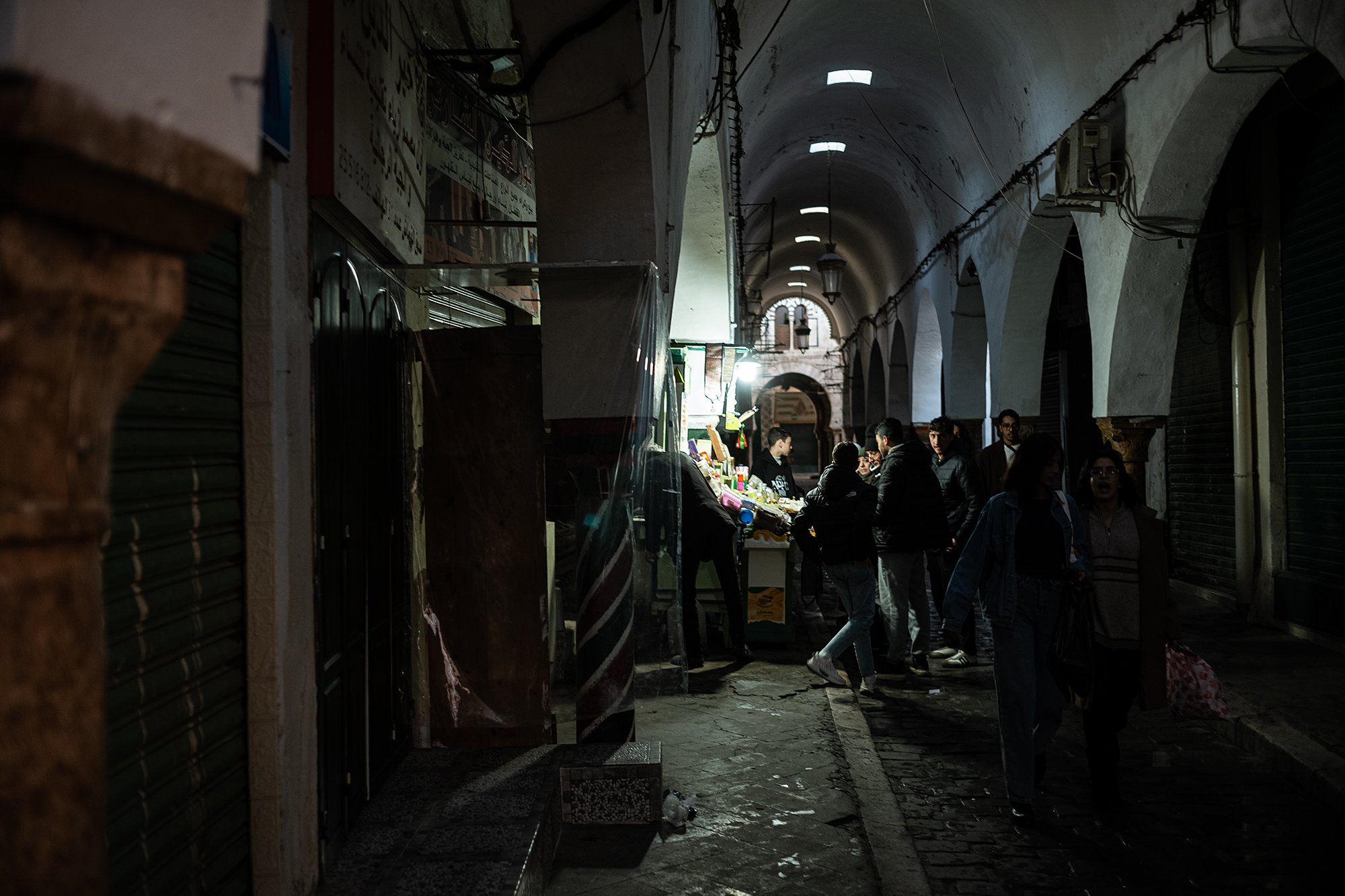
I make my way around some of the darker alleys of the souks and then out to a small courtyard before the mosque. A man stands by a set of stairs leading to the mosque itself. Big mosque, he says. I agree. Big mosque, and head back into the alleys, circumambulating the mosque to find an entrance.
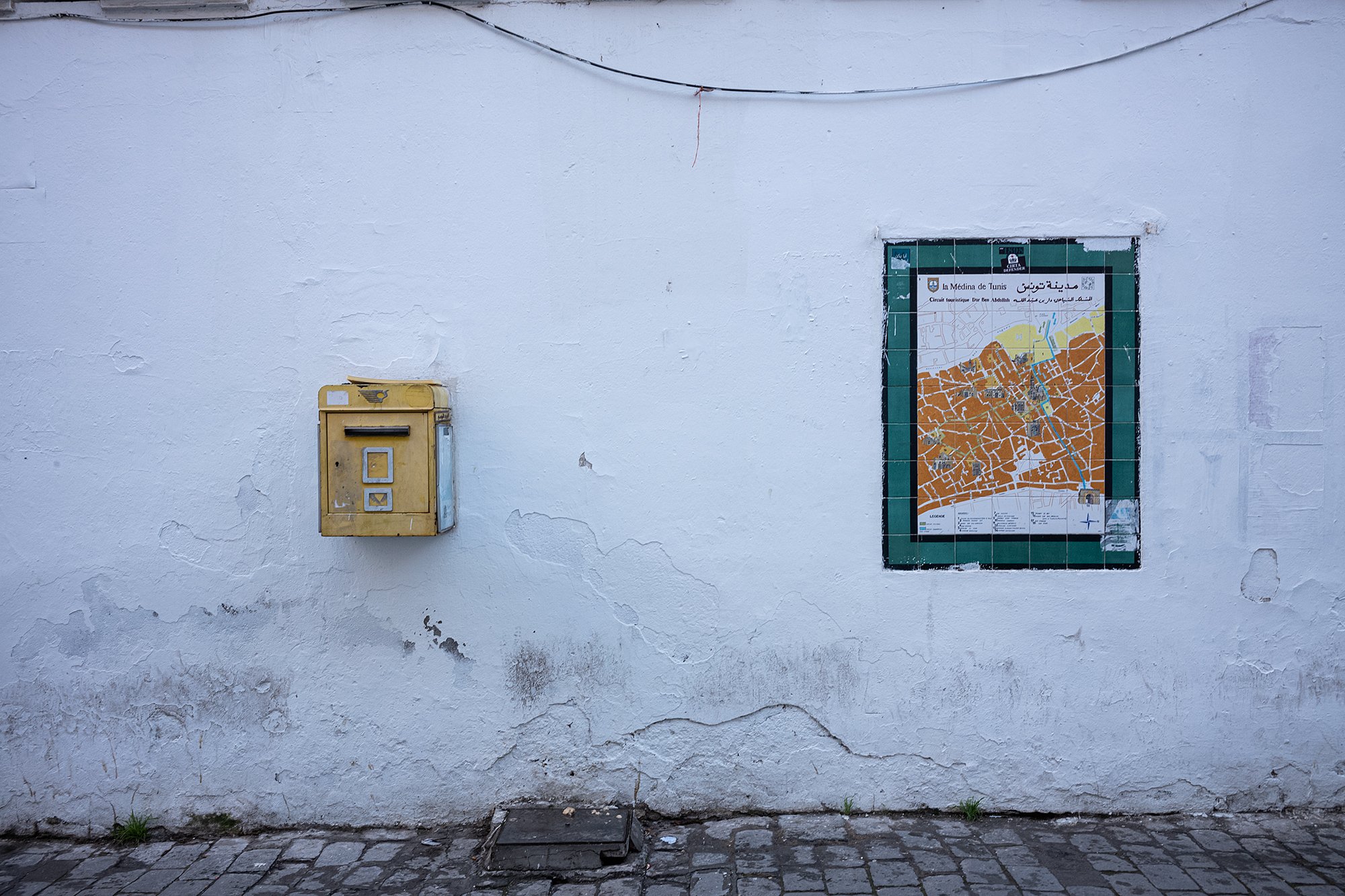
The shops alongside the mosque are all open, which make the streets feel even more cramped. Electric lights illuminate the covered quarters.
From there, stepping into the mosque is like stepping into the light, both figuratively and literally. The sun shines down into the courtyard and the space opens like the sky after a storm.
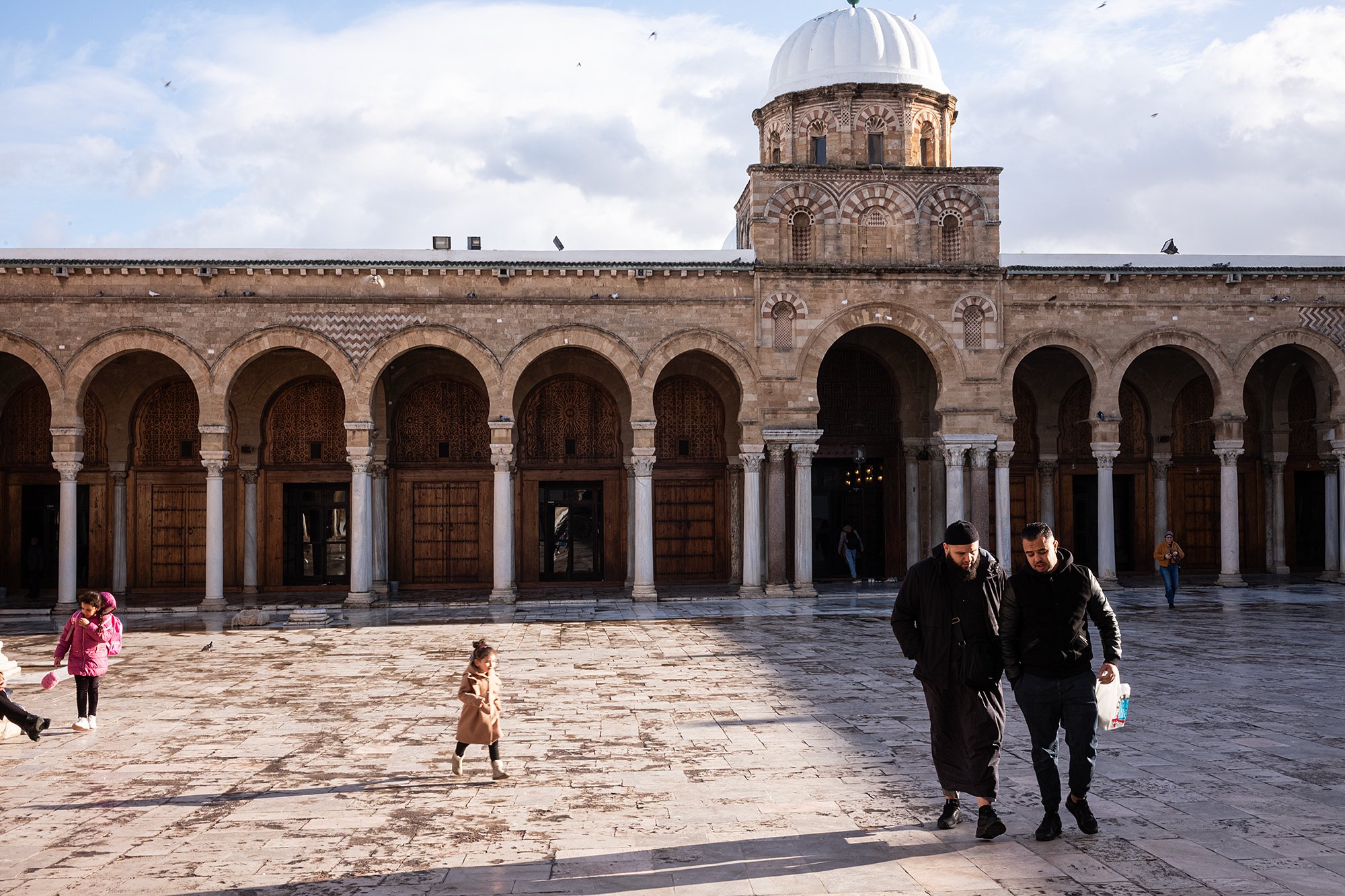
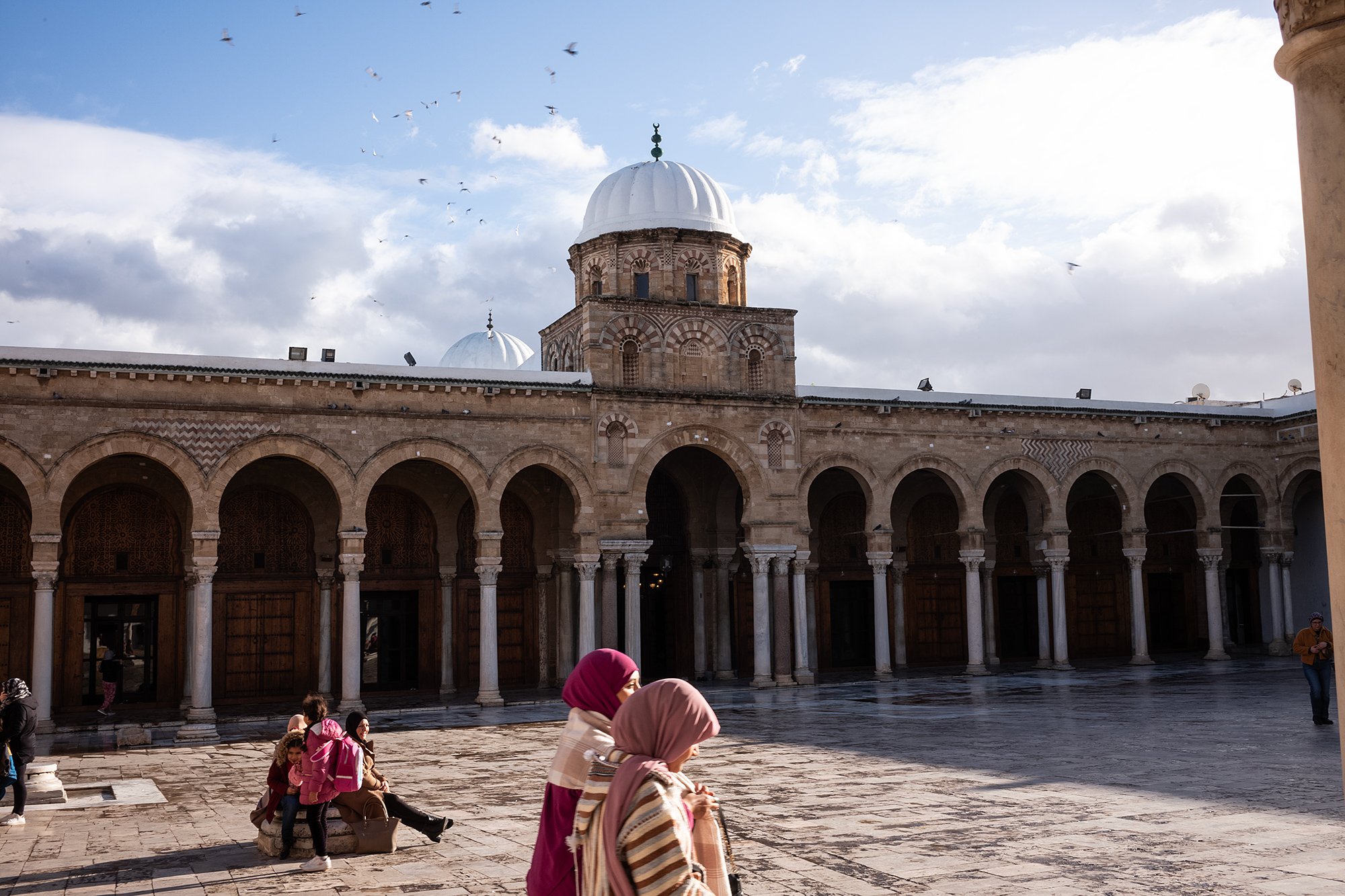
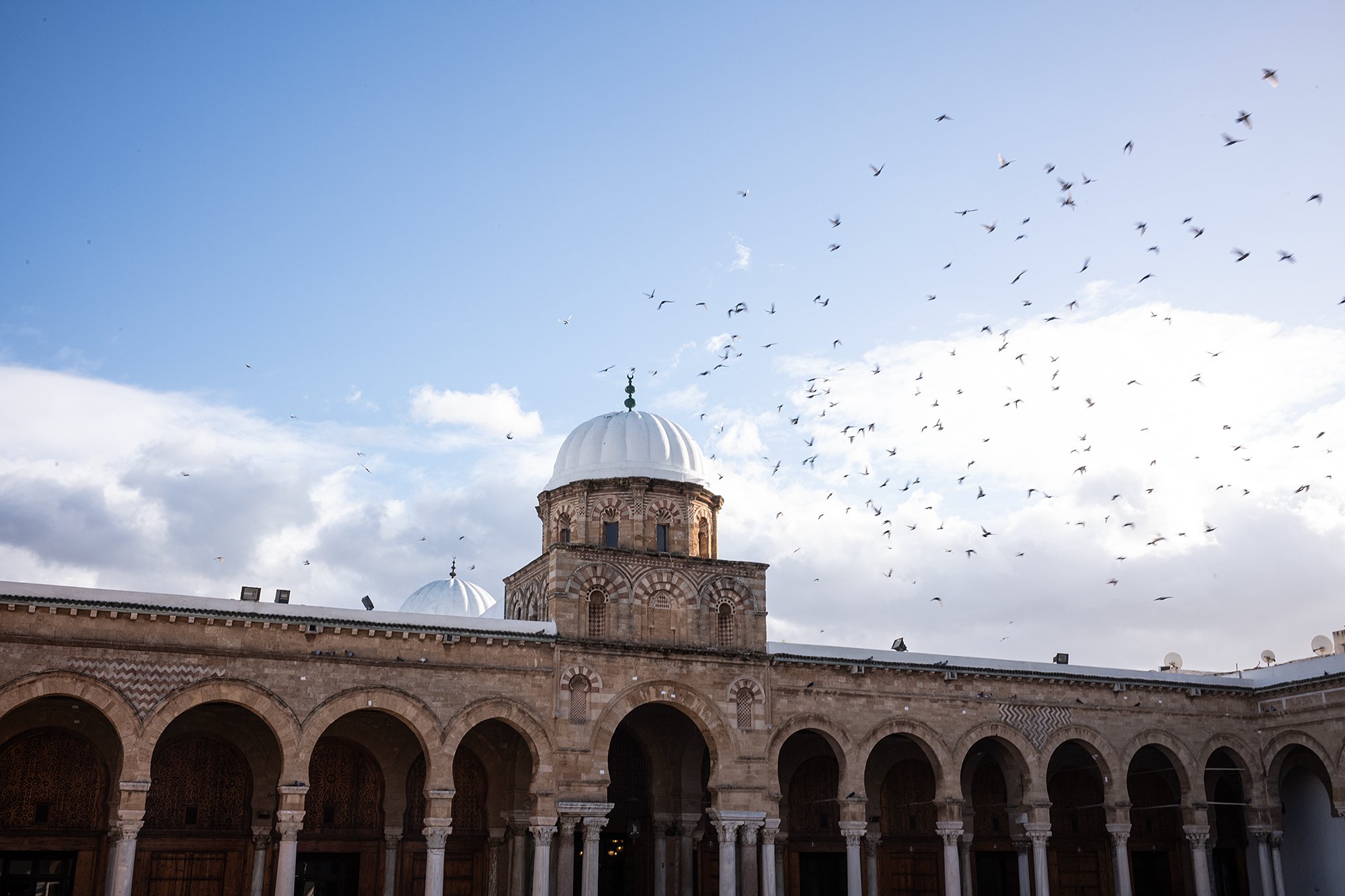
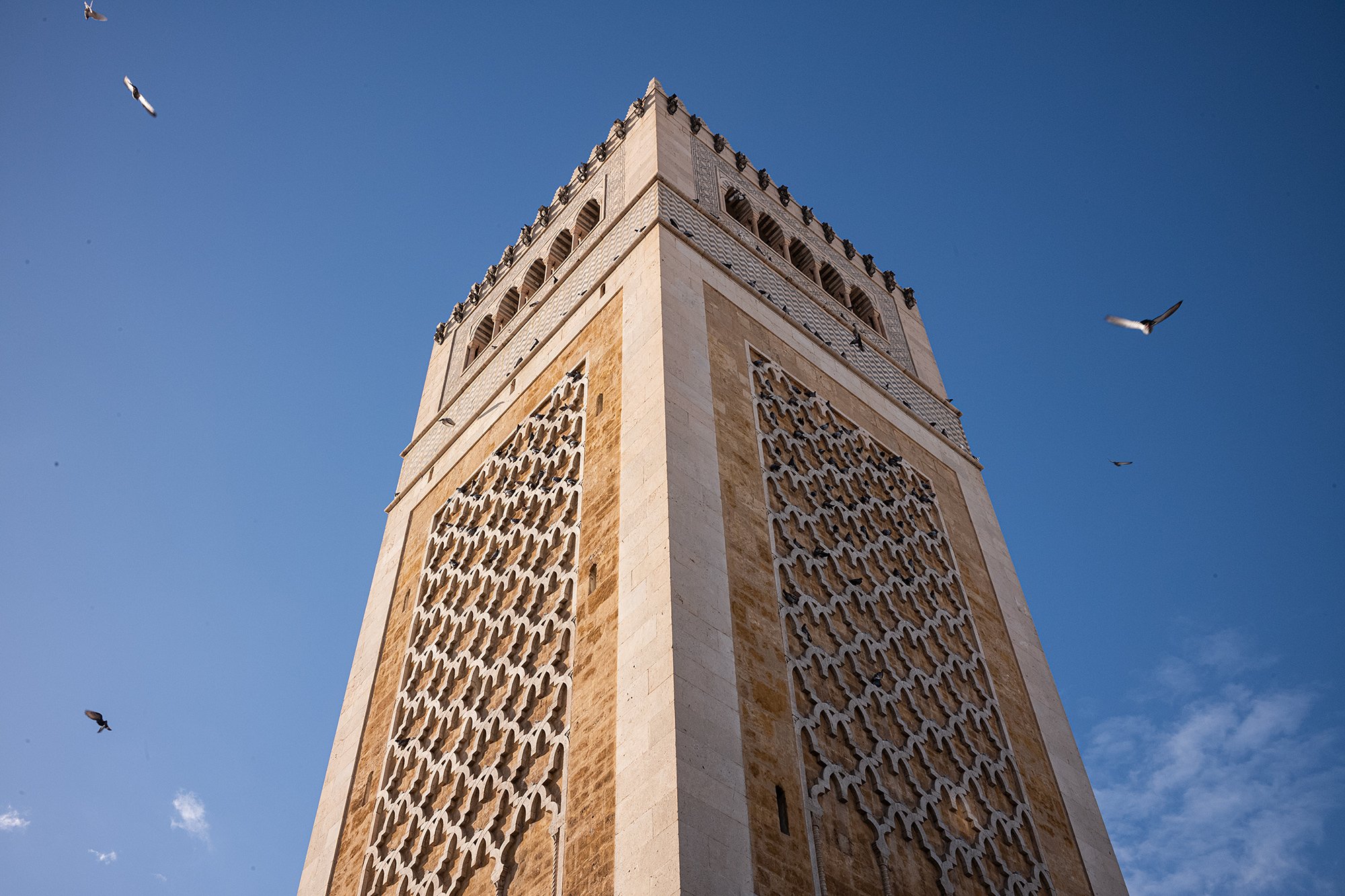
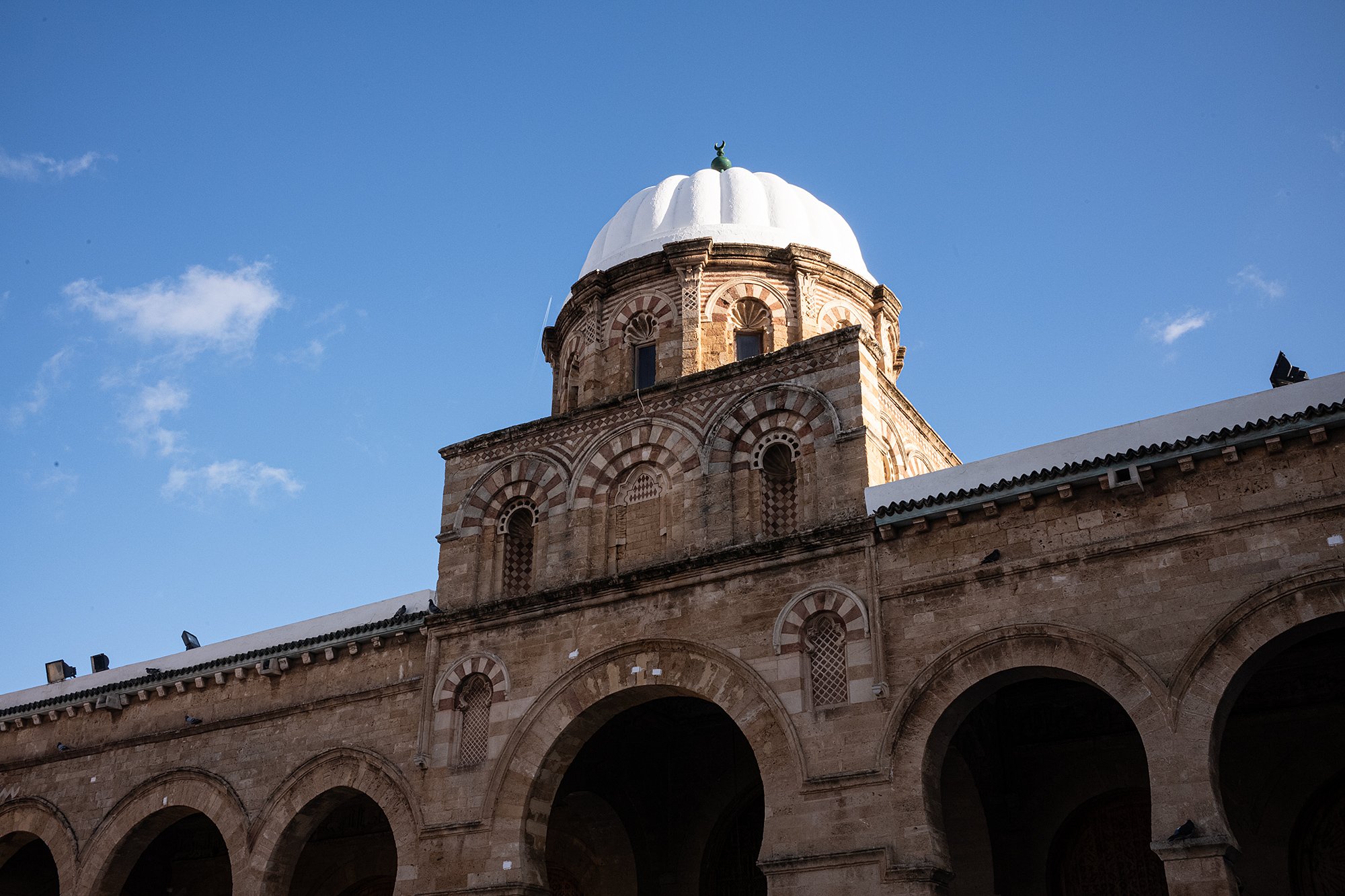
Flocks of birds flit between the dome and the minaret; a mixture of Tuisians and tourists stand in the portico and wander the courtyard. I linger for a moment in the portico to take in the view before crossing the courtyard. Taking off my shoes, I step inside.
Founded in the 7th century or in the early 8th century, It’s the oldest mosque in the city, hosting one of the first and greatest universities in the history of Islam. People pray and study and relax inside. Many visiting take pictures of the mihrab. One seems to have difficulty finding the perfect framing as he takes a step to the side, a step forward, a step to the side, another step forward.
Satisfied, he turns around and, seeing me, asks me to take his picture. I’m happy to.
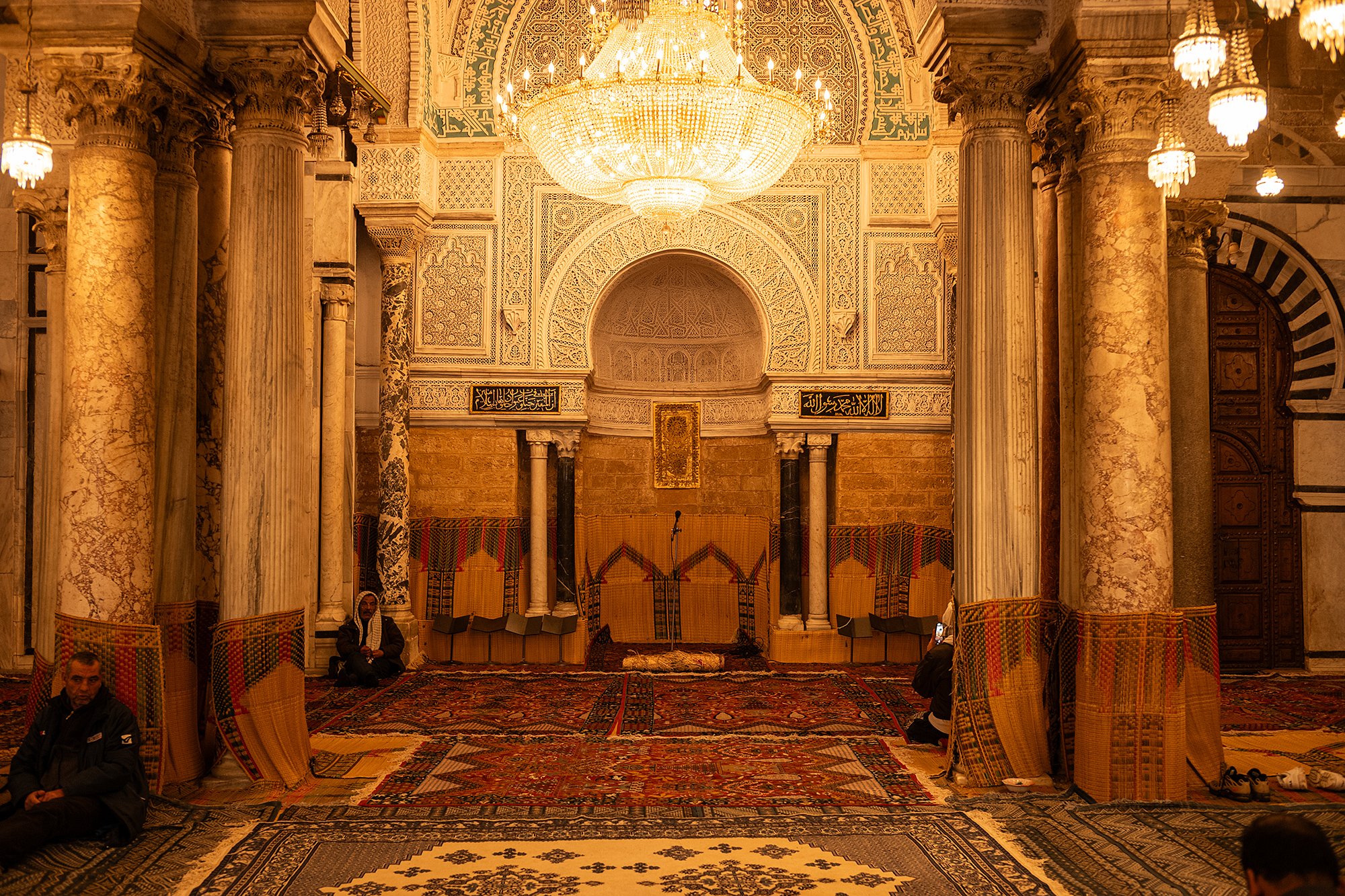
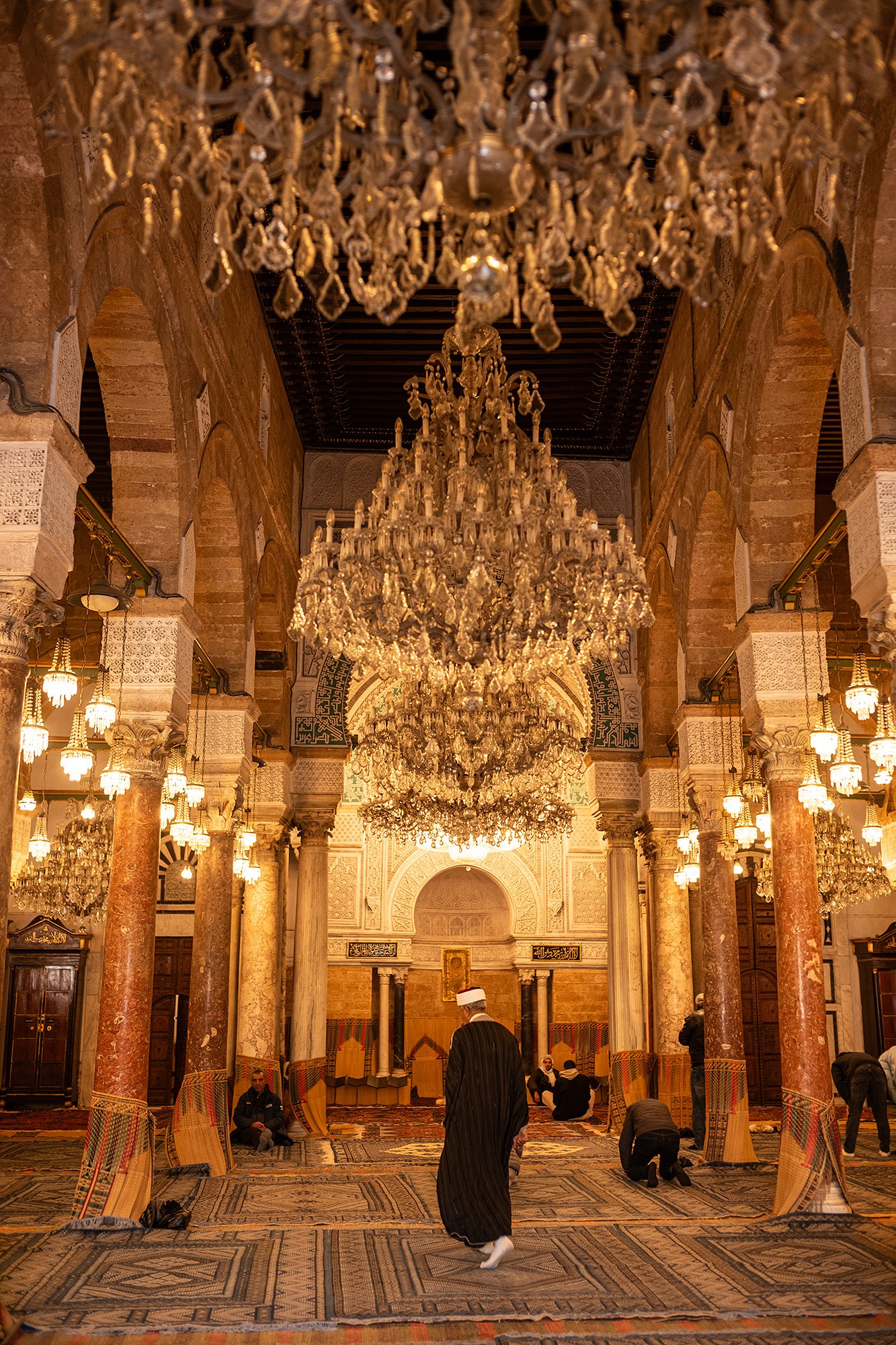
Back outside, I’m struck by the Roman columns hodling up the portico, and how it contrasts with the Islamic minaret that rises above it. I wander once more around the coutyard, turning to take one last look before heading back out into the souk.
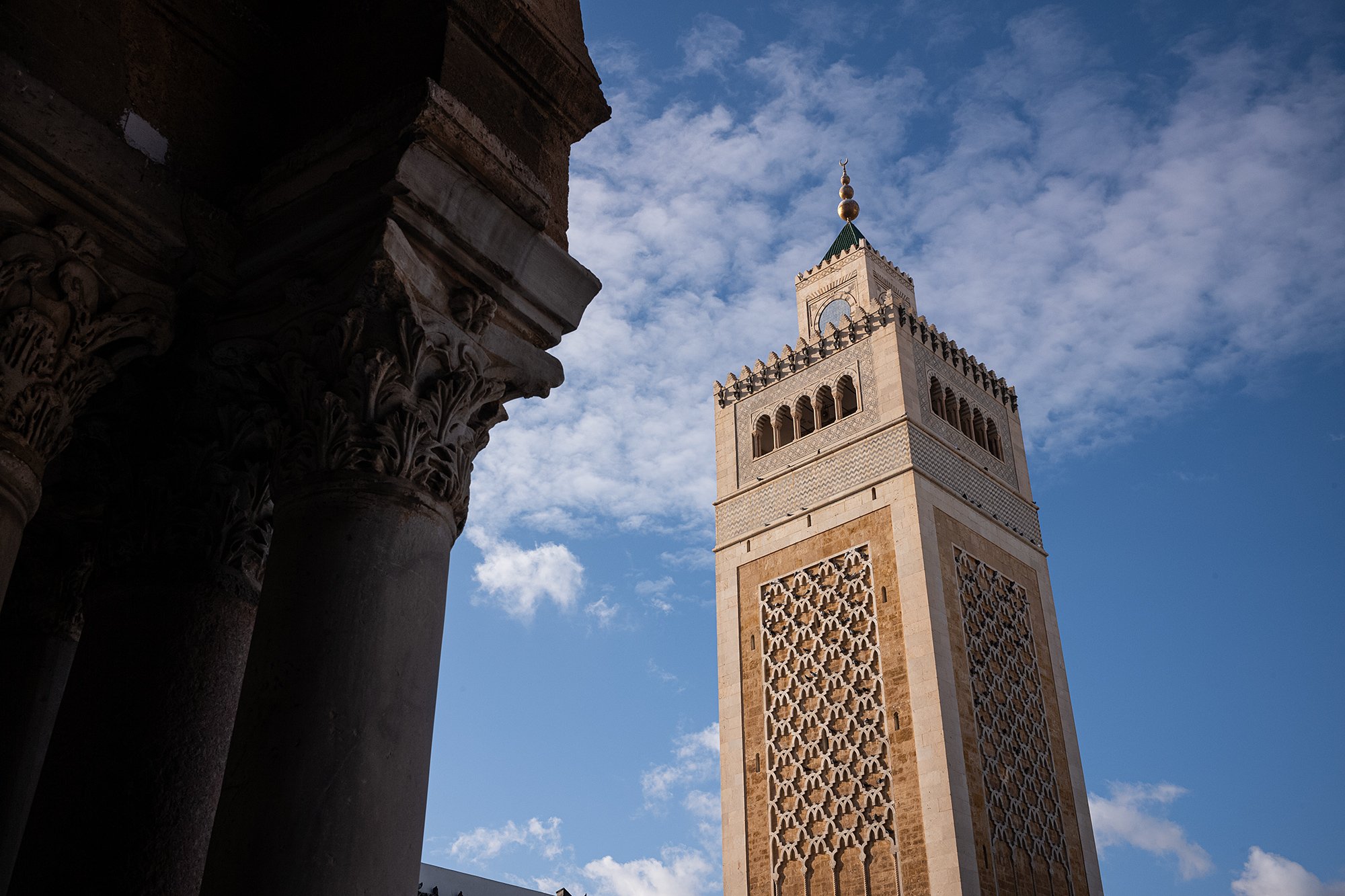
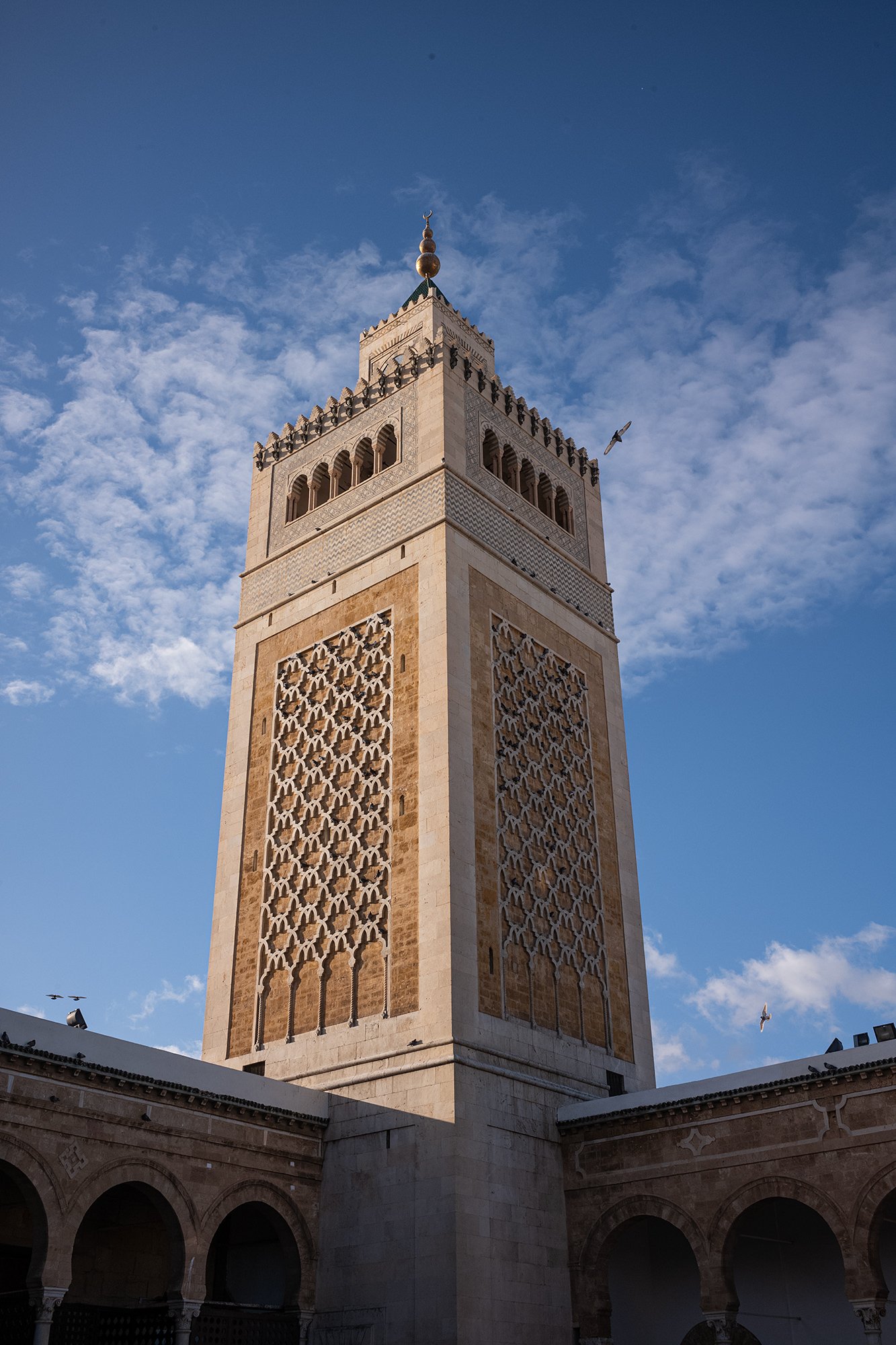
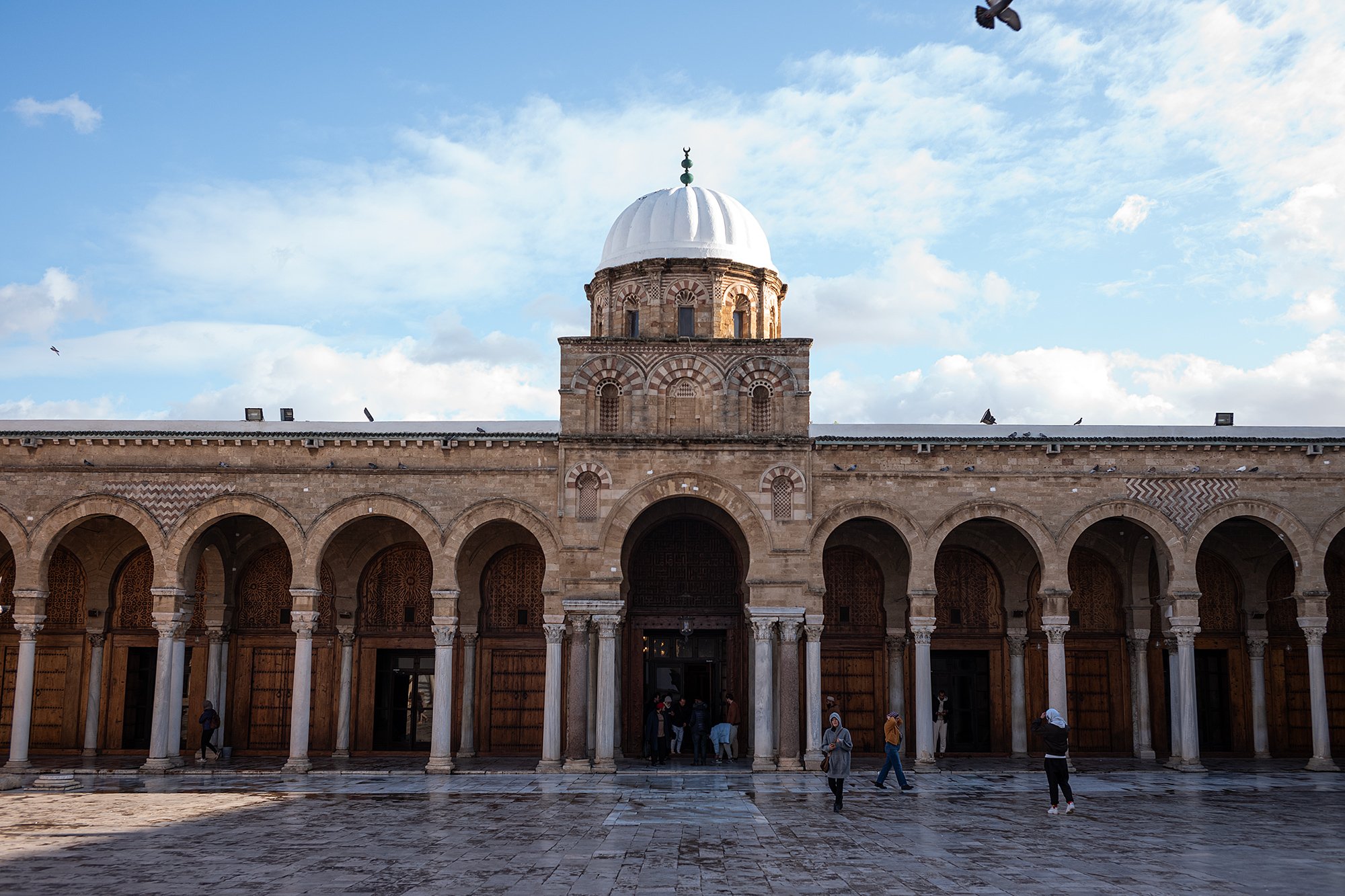
I walk some of the darker alleys before emerging into an uncovered section and bask in the light. I follow the road past where my next AirBnb is. Curious, I look for the entrance without being able to find it. It seems as though that section is all boarded up shops. Later, I’ll message the host asking whether the entrance is inside the jewlery shop. They tell me it’s a yellow door just beyond.
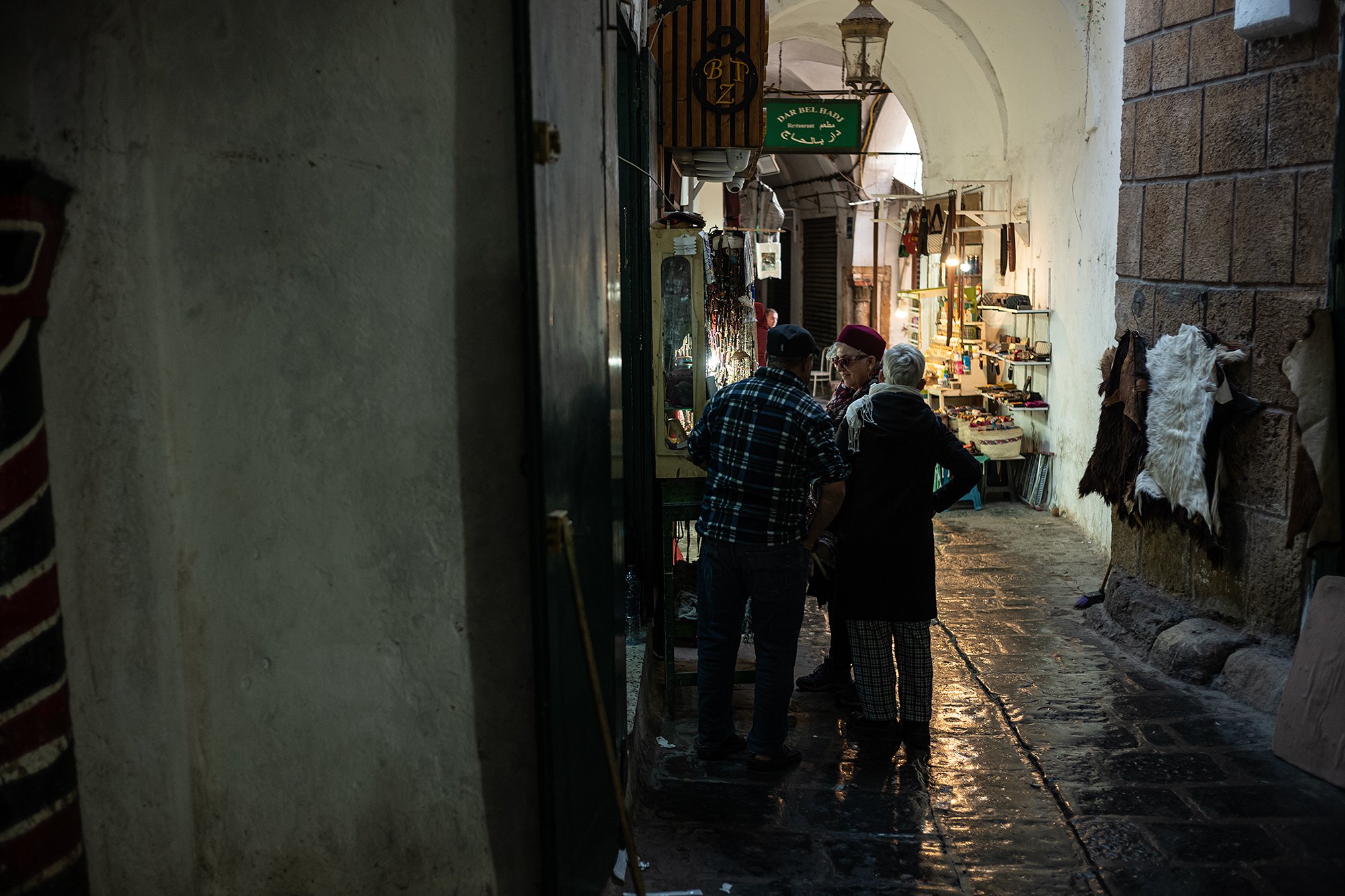
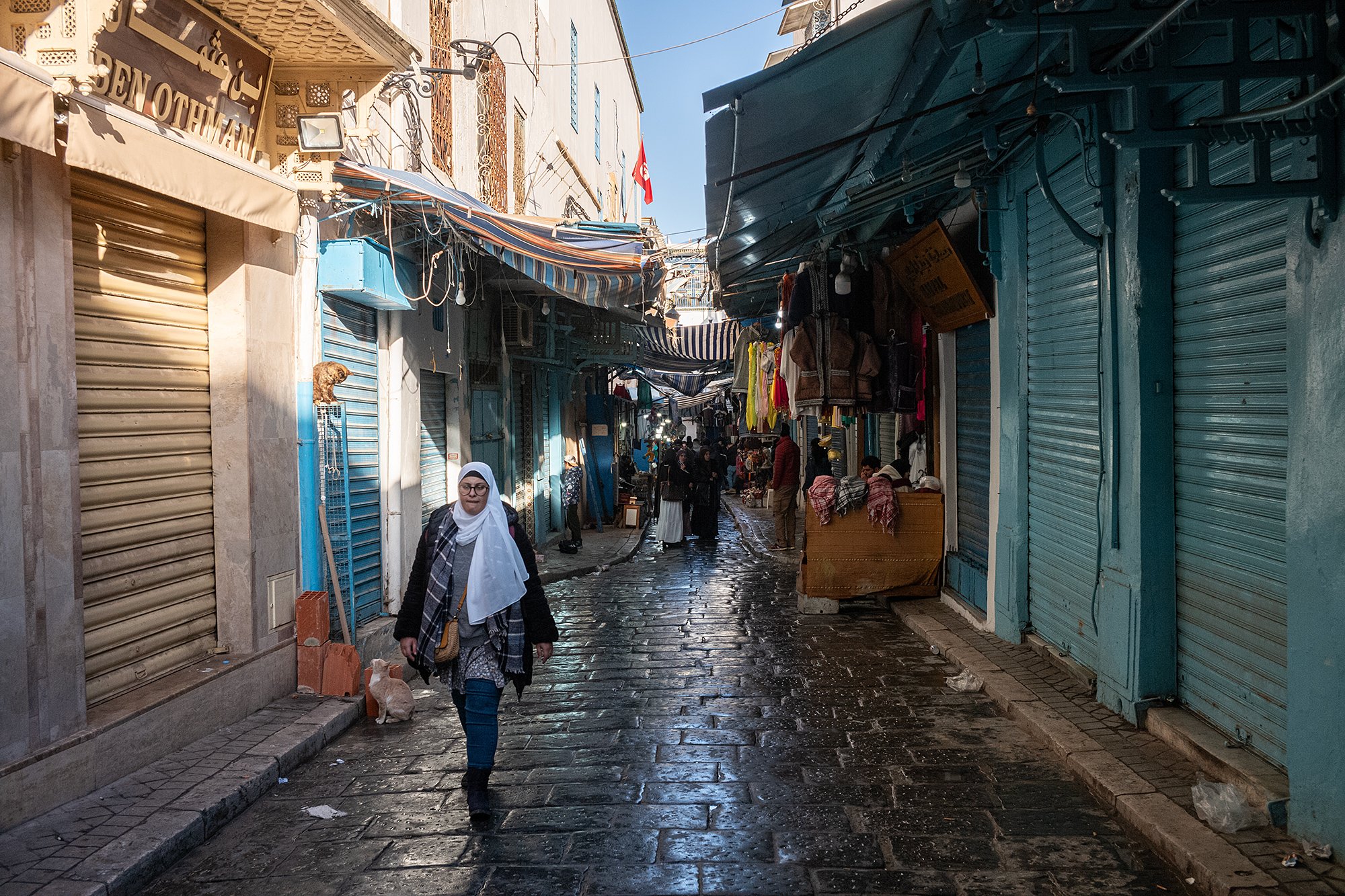
I end up at the Beb Bhar Tunis, the "Porte de France," which marks the unoffical entrance to the medina. The Royal Victoria Hotel, once home to the British embassy, dominates one of the corners. When considering places to stay, I had considered it, but ended up deciding to lodge myself inside the medina.
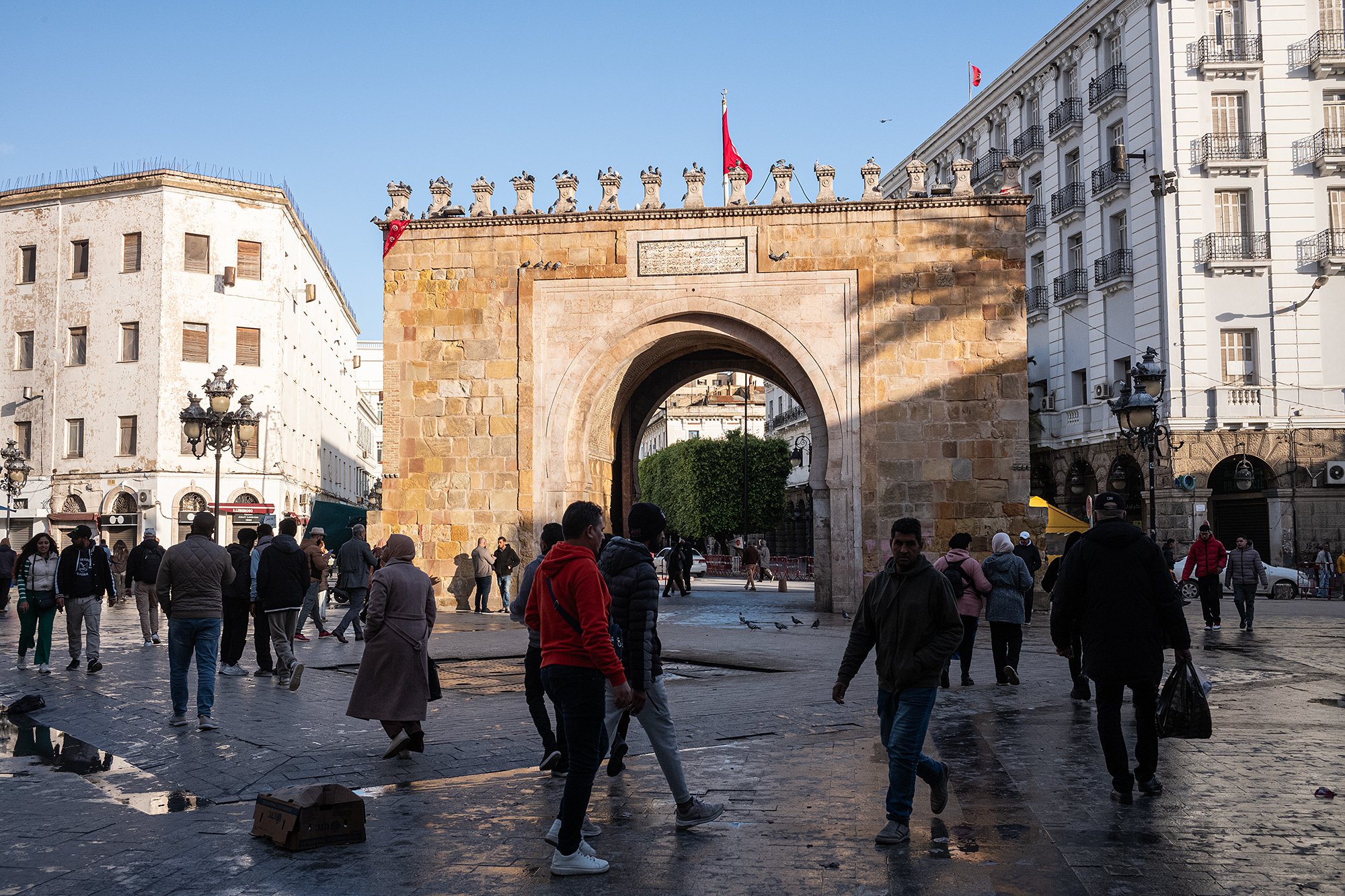
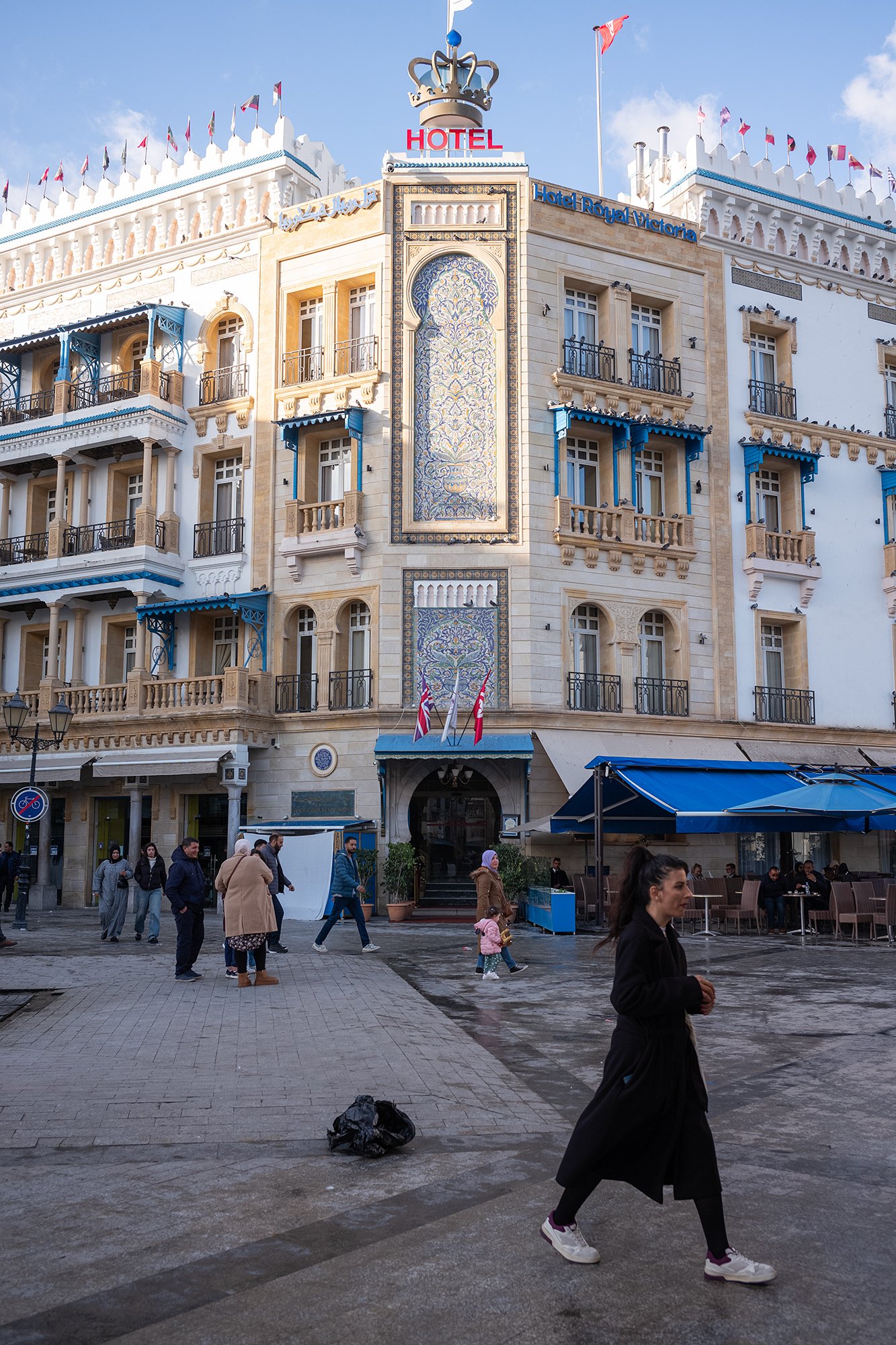
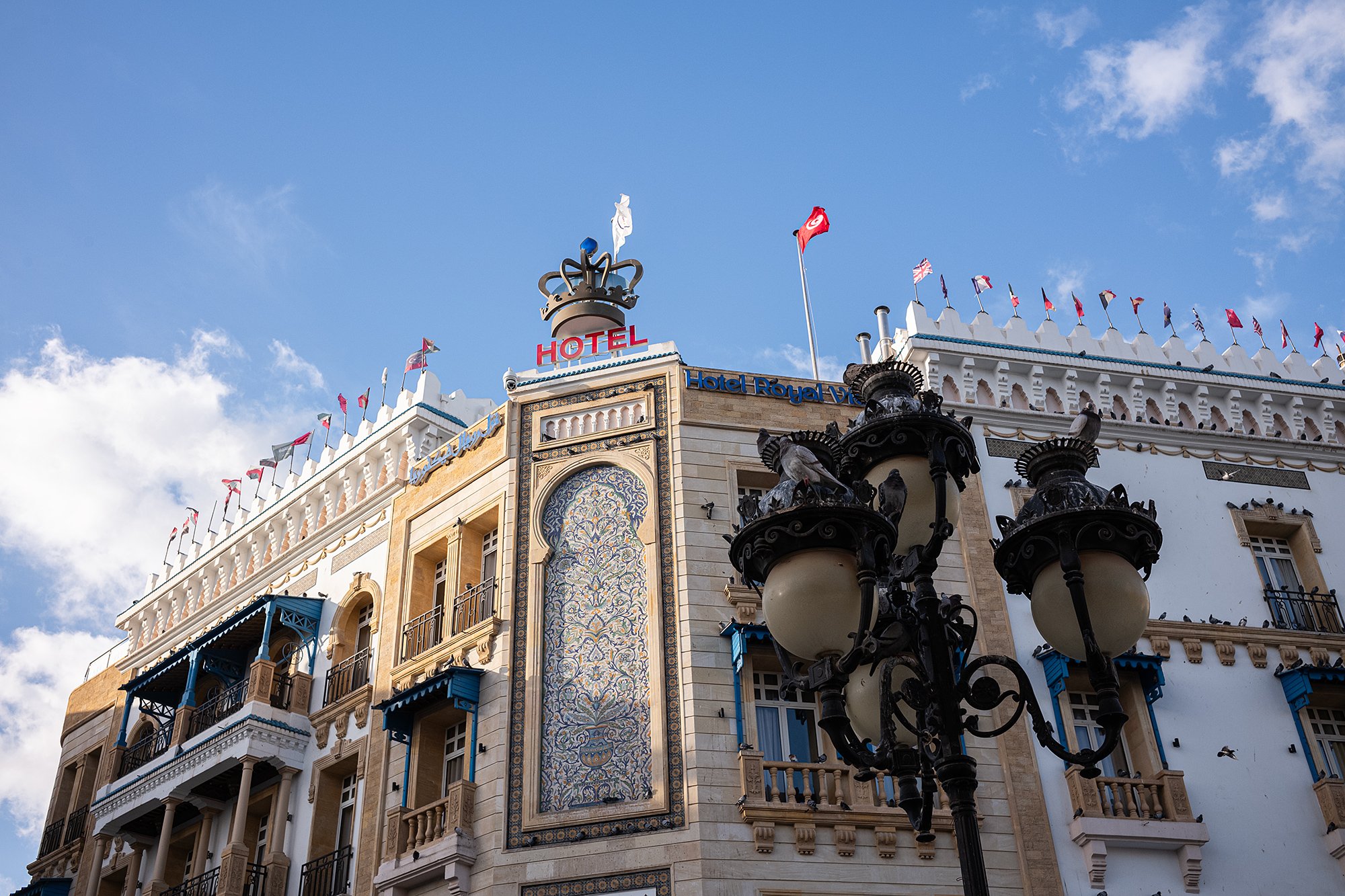
It’s a small square and I take some time to stand on the edges to people watch. I’m happy to be in Tunisia, back in a northern African city, and delight in the surroundings.
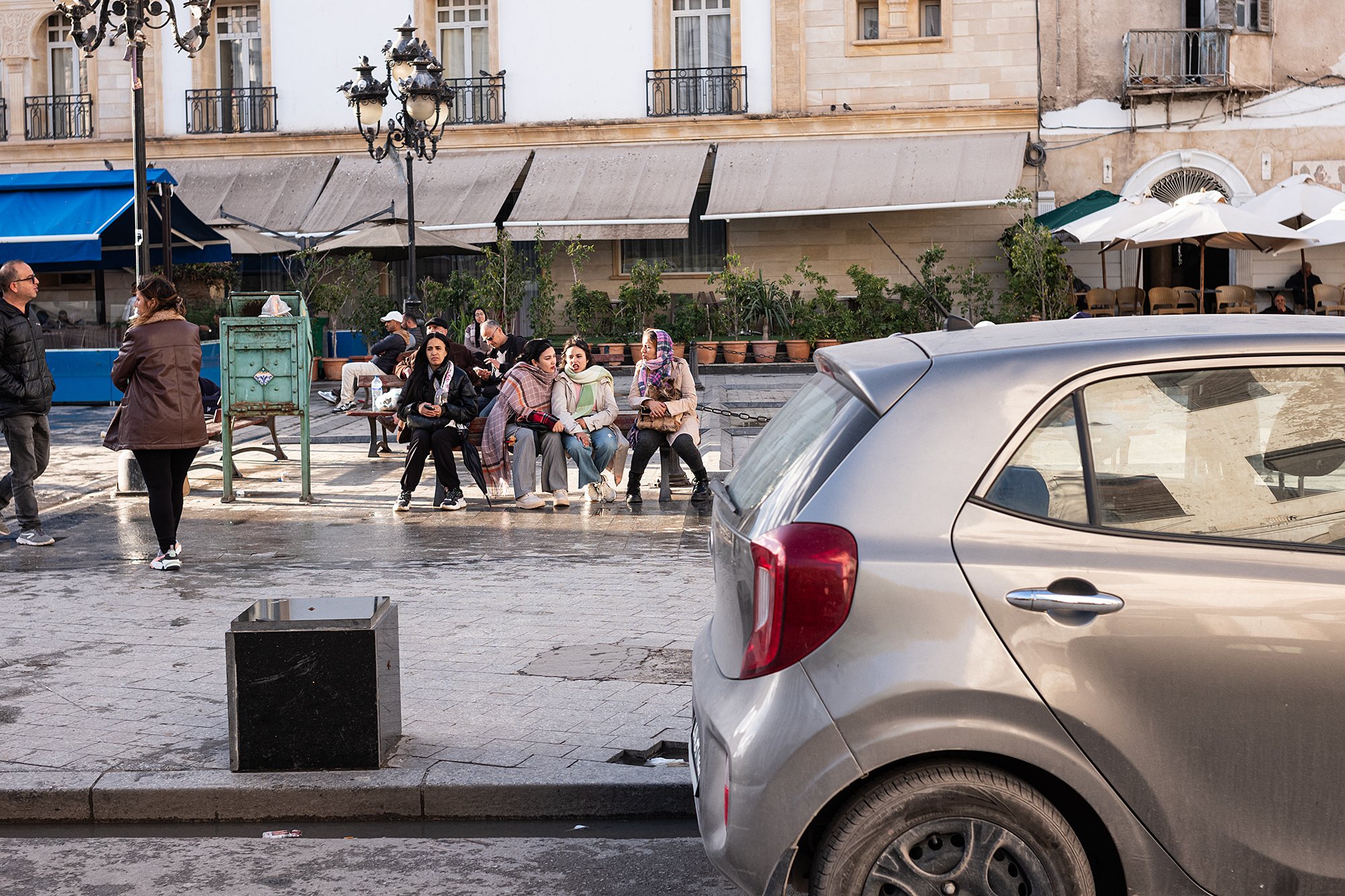
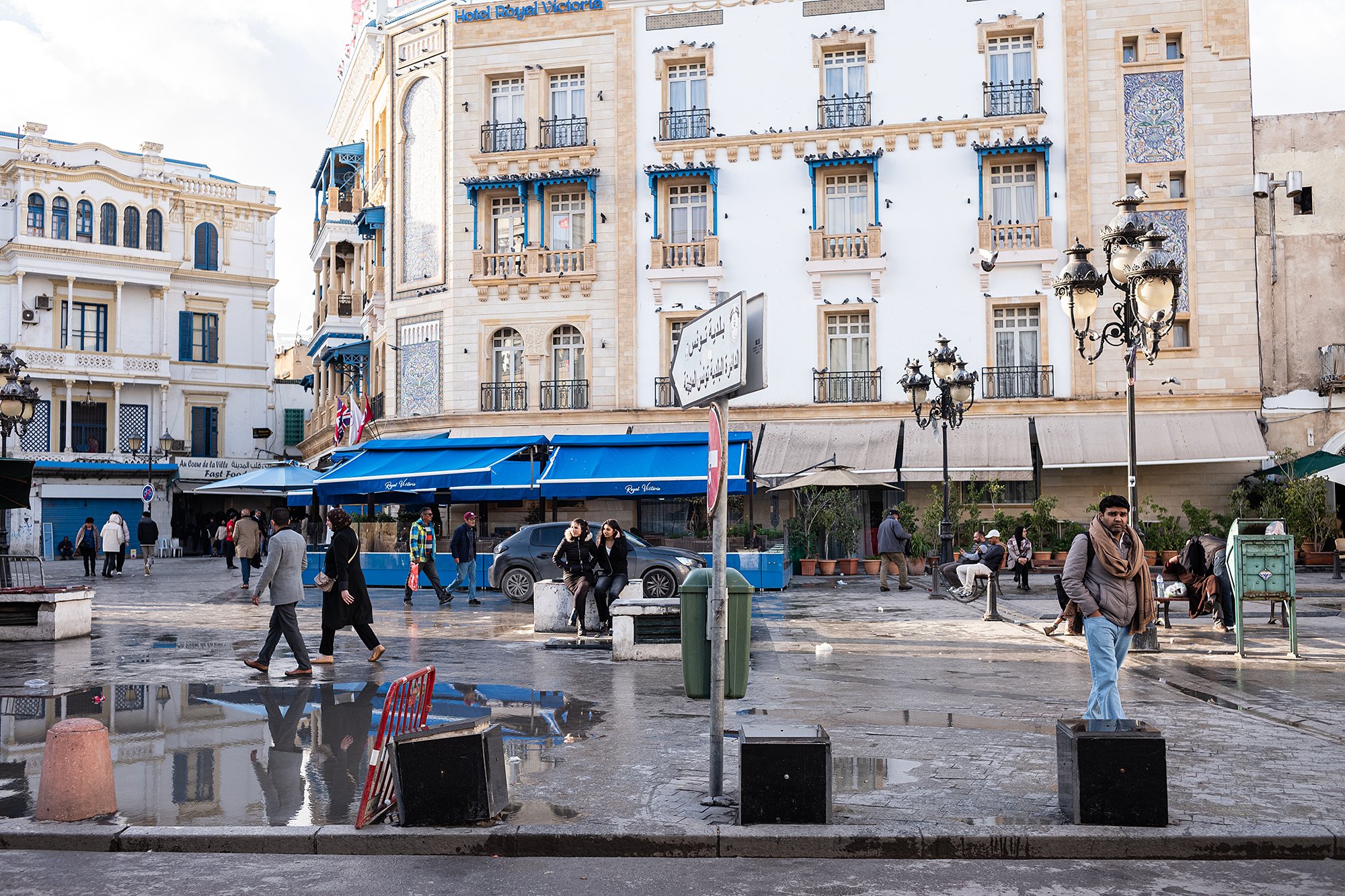
Heading back into the medina I walk west in the direction of my guesthouse. Passing it, I retrace the route I took this morning and find myself back at the hotel with the terrace restaurant. It’s one of the only ones I’ve found open.
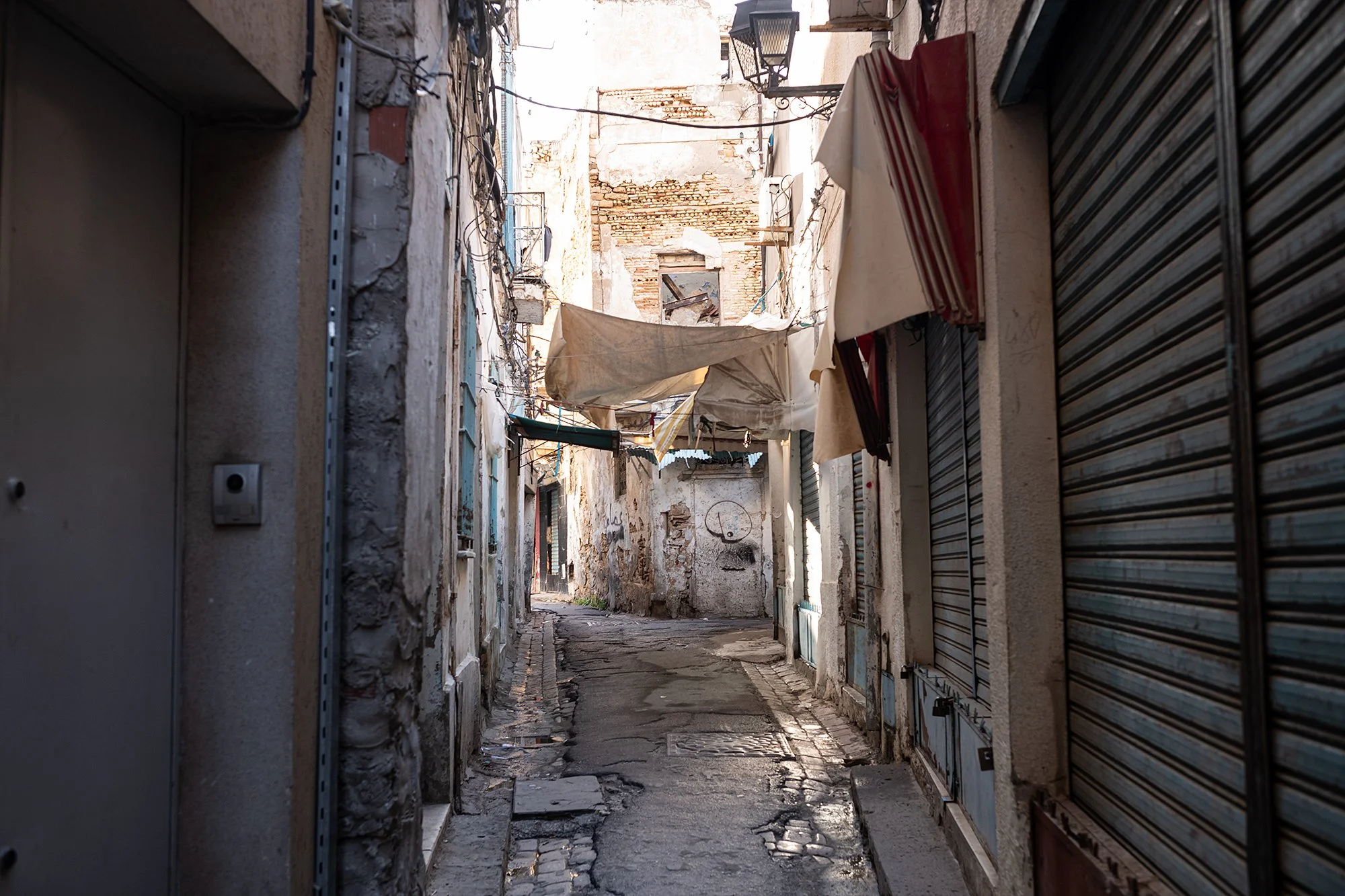
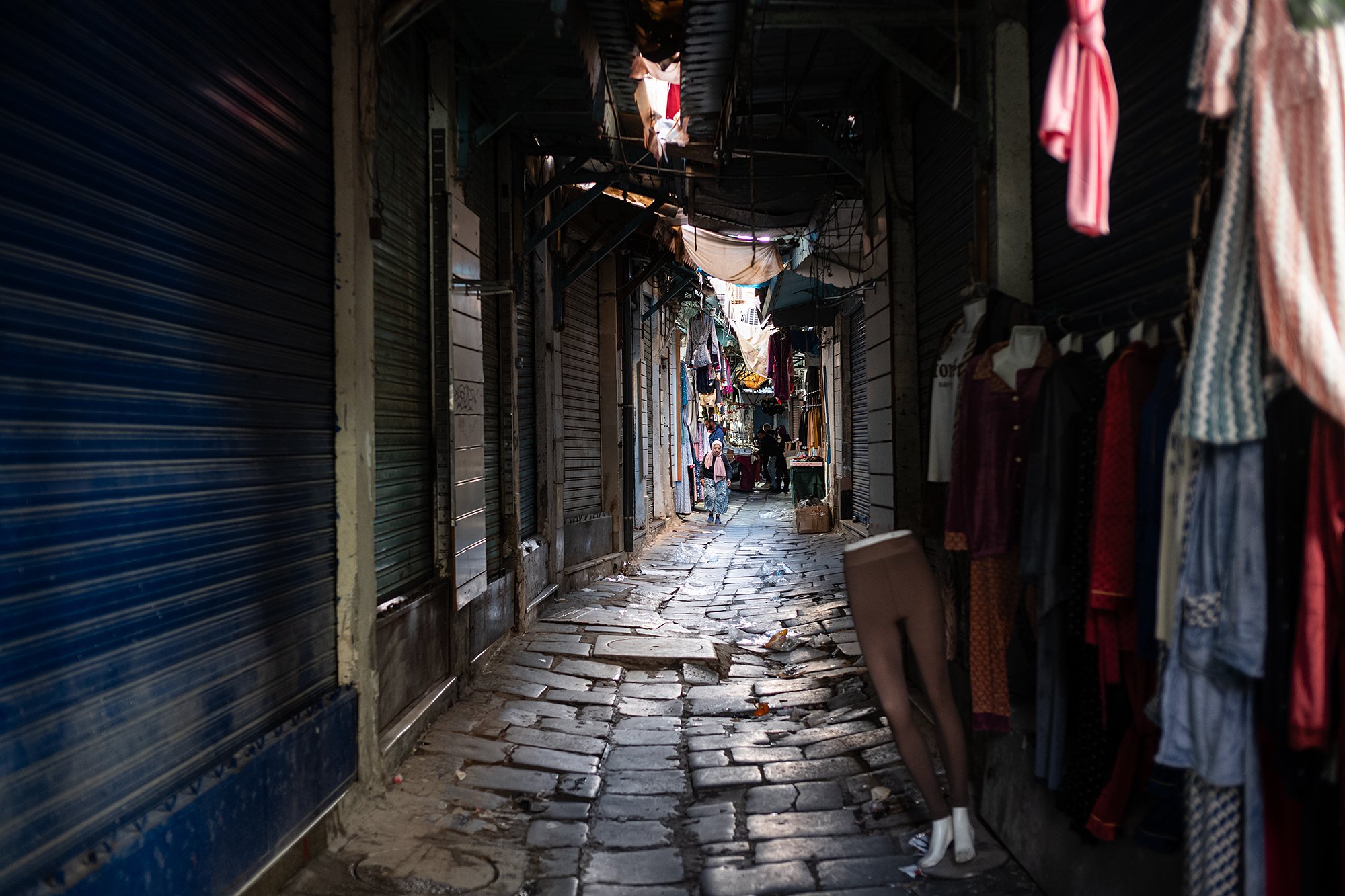
It’s still early for dinner, but I’m tired and hoping to go to bed early. I’m also hoping to see the sun set from the roof.
Unfortunately the terrace is closed and the host leads me to a table in a semi-private alcove around the courtyard. A Tunisian couple occupies the other table on the opposite side of the room. I order a cous cous with fish, my first meal in Tunisia, and write a few post cards.
After dinner the waiter asks if I would like some tea. I would and he brings me my first mint tea. Around 17h he returns to tell me that service has ended, but I’m welcome to sit as long as I would like. I pay the bill and pack up my things.
Outside, I see even the fast food places have closed for the night and I’m happy that I chose to eat early, for had I not done so I may not have eaten at all.
The sun is setting and the medina has taken on a bluish glow as the light fades. Nearing my guesthouse I see light illuminating an arch before me. My guesthouse lies just beyond, around a corner. The light glows with the promise of a warm welcome home. 🇹🇳
—22 December 2024
